#see? I even contradict my own points and disagree with myself
Explore tagged Tumblr posts
Text
Does anyone else, like, entirely lack a belief system of any kind and just run on primal instinct? I’ll listen to multiple sides of an issue and understand every bit of nuance, get emotionally invested, and then not pick any of them, because I think the reasoning of the respective beliefs cancel each other out when compared side-by-side. Then primal instinct takes over and forces me into acting more adjacent to one side than the other, but my brain does not necessarily agree with the entire position— only a portion of it; while also believing a portion of the other positions.
Or perhaps I merely think I have no opinions because the majority of today’s belief systems are so one-sided, while my positions are four-sided, and therefore unacceptable because I’m “not allowed” to agree with more than one side in any capacity without being ostracized by all of them.
I am proverbially lukewarm and in the process of being vomited out of the mouth of Christ.
#bite maim kill#or maybe I’m severely depressed and just not thinking clearly LMFAO#see? I even contradict my own points and disagree with myself#pathetic#I am my own devil’s advocate and his five frenemies#I also think holding up logic as a moral and ethical code is stupid#just because it makes sense doesn’t mean it’s right#and lots of good things in the world make no sense logically#but logic also works perfectly for other situations#and honestly everyone tries to make their point make sense when it literally doesn’t have to?#The sky is purple and whales swim in it#If I believed that; it wouldn’t be logical at all; but it wouldn’t hurt anyone on its own#Beliefs are harmless until they are acted upon by their holders#But some beliefs are beliefs that call for action in and of themselves#Therefore making the belief itself harmful#2+2=5 is a harmless belief on its own; but if you torture someone to get your point across that’s a different story#so zealousness/vindictiveness also plays a role in the potential harm a belief can do#but a belief such as “all bees are are harmful to humans” tells humans to be afraid of bees; fear breeds resent which breeds murder#which leads to genocide#so the emotions (and intensity thereof) involved also dictate how harmful a belief can become#I like to think of beliefs in terms of empty guns VS loaded guns#which is why I don’t like picking a direction to shoot in#idk maybe there’s black mold growing in my room and I’m going insane from inhaling the fumes#because I’d like to say “I’ll just do and believe what I want” but I don’t want to do anything; the only thing moving me at this point#is blind compulsion#I do things but I do not enjoy them before or after I do them; only during (barely)#I do things because I am incapable of sitting still#I do not want to do things#everything I do is soulless
2 notes
·
View notes
Text
Honestly I hate that every meta post / analysis / discussion is viewed as "discourse" more often than not. And the idea that one interpretation MUST reign supreme among fandom. That we must all agree in order to get along. Or that one post is the end all be all of someone's takes. As someone who often enjoys entertaining multiple / contradictory takes and angles of interpretation it's...annoying. My opinions also evolve and fluctuate on rewatches / depending on mood / depending on fandom climate at the time / etc.
I like having discussions with friends (sometimes those discussions are public, sometimes they're not). I like trying to see their POV. Sometimes I come away seeing things differently. Sometimes I don't. Sometimes I AM more critical of other characters in the moment. Sometimes I give them more grace. Sometimes I'll make a post in a rewatch, feeling big feelings, and then come back later to amend it, with a more balanced perspective. But there have been times when I have been blocked / unfollowed for one angle or take and that ends up not even being my MAIN mode of interpretation but just something I was rotating around. idk sometimes a post is not the end all be all of what someone thinks abt a character / plot point / story arc. Sometimes we can be critical without being a capital H hater. There is room for nuance. multitudes. contradiction. We can have preferences or think something was not portrayed as well as it could have been. We can be annoyed by those things and talk abt them. I also do not need to agree with every single take my mutuals and pals have. Sometimes I heavily diverge, and that's ok! I think having different viewpoints and candid discussions is often beneficial to fandom. But these discussions are not all "discourse" or "fandom fighting." Sometimes people just have different opinions or interpretations. Sometimes what looks like "discourse" is actually just fandom friends discussing differing viewpoints.
As someone who also likes arguing a thesis and citing sources to support an argument and doing analysis and literary interpretation, I can say that even for takes I don't necessarily agree with, effective arguments can be made for that interpretation and supported by canon evidence. I think that's why "open to interpretation" often chafes at some fans. Because it means multiple interpretations CAN exist and be effectively argued. Mine and yours. There is no one singular ultimate truth in literary interpretation. Not even authorial intent. That's the beauty and fun of media analysis IMO. We can each find different meaning from the same source material and diverge. I may continue to argue for my interpretation (in the academic sense of "arguing a thesis") because that's the position I've chosen to align with, but that doesn't mean I think it's the only one you CAN have. And no, not all interpretations are created equal or are argued in good faith. Some ARE more valid than others and better argued / supported. And sometimes an interpretation is only one of many a person can have.
Overall, I don't like the idea that fandom needs to be a hive mind, and that we all MUST have the same opinions or interpretations or come away from the show feelings the same way or else it's "ruining the fandom fun." Sometimes I staunchly disagree with people, especially when takes are rooted in bad faith fanon more than anything that actually transpired on screen. I won't play nice with people that are just Making Up Some Guy to be mad and insisting I must also hate that guy, who doesn't exist. But I can and do have discussions with friends and mutuals where we interpret canon events differently! And I value those other perspectives. They challenge me to question my own viewpoint, to interrogate my takes, to check myself when I get too rooted in Only One Way of thinking. I don't want there to only be one way of interpreting. And sometimes even I will contradict myself and explore other avenues, for the fun of it.
and before THIS post gets interpreted as discourse I would like to issue the disclaimer: that this isn't directed at any individual blogger or any specific post. do not go after anyone. this is just some general thoughts and feelings I've been having about fandom for a LONG time.
111 notes
·
View notes
Text
A (Negative) Review of Tom Taylor's Nightwing Run - What Went Wrong? Villains
Introduction Who is Dick Grayson? What Went Wrong? Dick's Characterization What Went Wrong? Barbara Gordon What Went Wrong? Bludhaven (Part 1, Part 2) What Went Wrong? Melinda Lin Grayson What Went Wrong? Bea Bennett What Went Wrong? Villains Conclusion Bibliography
During a discussion, Dick Grayson Fan C explained the importance of a balanced hero and villain dynamic by describing their relationship as inherently “symbiotic.” The two, after all, are interlinked, and the success and failures of one affects the way the audience perceives the other. When the audience knows that the hero will win the final confrontation, the questions surrounding how they will do so and what price they’ll pay to achieve said victory is what creates tension. In other words, the way in which a struggle unfolds is just as, if not sometimes more, important than its outcome.
Note that this symbiotic antagonistic dynamic is not limited to physical confrontations. A good hero-and-villain relationship is also an exploration of the protagonist’s psychology, their motivations, and the thematic questions of a story. A well-crafted villain should not only be providing a challenge to the hero in the battlefield, but also call into question the truths — or lies — that the hero believes in.
Taylor’s antagonists fail to provide Dick with any such challenges. And, as such, they fail to provide Dick with the opportunity to truly demonstrate who he is and what values Nightwing embodies
To prove my point, I wish to compare Taylor’s handling of Blockbuster with that of Chuck Dixon and Devin Grayson. While I considered also analyzing Heartless in detail as well, because the main Heartless confrontation is currently unfolding as time of writing, and because my main gripes with how Heartless was handled during the beginning of the run have already been addressed in other parts of this essay, I opted instead to keep my mentions of him brief. Furthermore, not only does Taylor’s parroting of Dixon’s and Grayson’s runs makes the comparisons between their Blockbusters unavoidable, but his take on Roland Desmond perfectly demonstrates how his simplistic morality contradicts the nuanced themes of social justice that seem to interest him.
(Similar to an earlier disclaimer I made on Dixon, I want to make it clear that just because I am comparing Grayson’s run favorably to Taylor’s, it does not mean that I am unaware of the issues present in her own story, nor that I disagree with much of the criticism directed at it. Despite enjoying much of what she wrote, I also readily concur that there are problematic elements to it, and I often found myself questioning her intentions as I was unable to discern them. But that is something that would deserve its own essay and I do not want to further derail this one by discussing the extensive controversies about Grayson’s run and the way it is often regarded by Dick Grayson fans. Regardless of one's opinion of Grayson’s statements, I believe it is unquestionable that she handled Blockbuster’s ruthlessness and the way he personally terrorized Dick through a form of targeted persecution that was mentally and emotionally torturous was leagues above the generic intimidation tactics employed by Taylor’s Blockbuster.)
When I claim that Taylor’s characterization of Blockbuster reveals his simplistic morality, I do not mean to imply that I wish for Blockbuster (or even Heartless, for that matter) to be sympathetic. I do not believe that they must have redeemable qualities that endear them to the reader in order for them to be interesting. While I enjoy the tragic villain trope, I’m also a big fan of the terrible villain who gets under your skin and inspires such hatred that you cannot wait to see them defeated. I believe that just as a person can enjoy both comedies and dramas without thinking one genre is superior to the other, we can also have all sorts of villains and enjoy them on their own terms.
That being said, I do expect villains to be interesting. I expect them to be meaningfully contributing to the story not only in terms of narrative conflict, but in challenging the protagonist, in creating stakes, and in being in conversation with the themes explored in a story, whatever those themes may be.
So know that when I am criticizing Taylor’s villains, I’m not doing so because I wish they were completely different characters from whom they were intended to be. When I critique their simplistic morality, I do so because Taylor invited such criticism when he coated his run in the veneer of social and political justice commentary by alluding to real world problems and trying to show how Dick Grayson would resolve them.
Let’s start by defining who Roland Desmond is, what conflicts his presence generates, and what he is meant to stand for in the narrative.
When examining Redondo’s design for this character, their intentions come through almost immediately: Blockbuster is meant to be threatening, corrupt, and ruthless. He is meant to be the type of oppressor who enriches himself at the expense of others. He yields his power to remain on top of the food chain, shamelessly bribing politicians and threatening his enemies. He will stop at nothing to retain control, he will not hesitate to destroy those who so much as dare to think about standing in his way. He has no sympathy for others, he does not care about their suffering, and he will gladly sacrifice their lives and the lives of their loved ones to get what he wants. All of these characteristics are physically manifested in his design, in which his oppressive frame demonstrates how he overpowers others and his giant hands are shown to be the type that could crush one’s bones just as his shadowy reign over Bludhaven crushes the city’s soul.
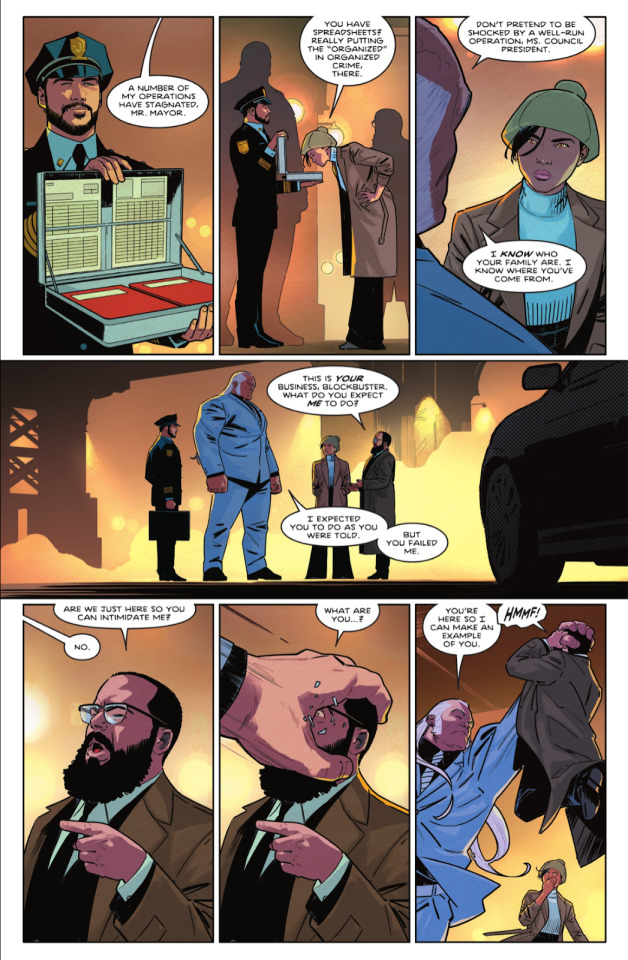
(Taylor, Tom, writer. Redondo, Bruno, illustrator. Leaping into the Light Part Two. Nightwing: Rebirth. 79, e-book ed. DC Comics, 2021. pp 14)
We can see this also through the dialogue of the story. For example, in #81, Melinda gets sworn in as mayor and Blockbuster’s men, in order to demonstrate the power they have over the politicians in the city, give her a suitcase full of money as a representation of the bribes that will be coming Melinda’s way.
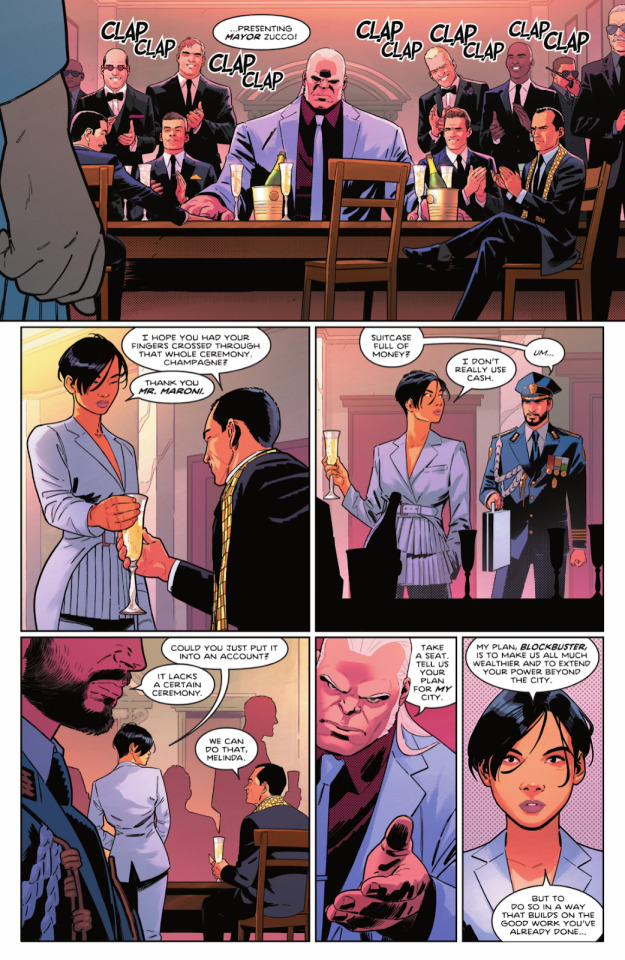
(Taylor, Tom, writer. Bruno, illustrator. Leaping into the Light Part 4. Nightwing: Rebirth. 81, e-book ed. DC Comics, 2021. pp 04)
Melinda, in order to continue her work undercover, plays into that by stating in a line that is as devoid of personality as it is of subtlety that, as mayor, she will make them all wealthier.
Similarly, in #83, Blockbuster states (also with little personality and little subtlety) that he owns the courts, that he sees himself as entitled to Bludhaven, and that because of the power he yields, he sees himself as invincible.
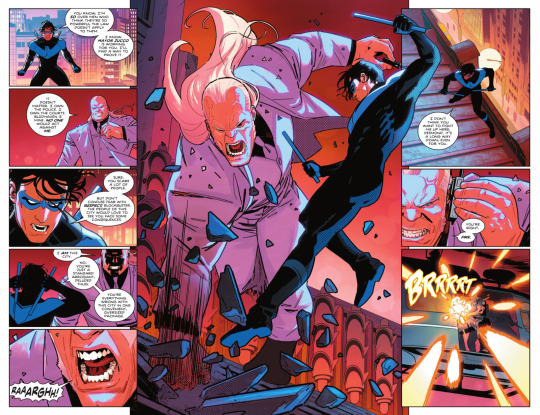
(Taylor, Tom, writer. Redondo, Bruno, illustrator. Leaping into the Light Part Six. Nightwing: Rebirth. 83, e-book ed. DC Comics, 2021. pp. 08)
Nightwing reaffirms this idea in that same issue when he says (also devoid of personality, subtlety, and this time charm or wit) that Blockbuster is “everything wrong with this city in one convenient, oversized package.”
This is what the conflict between Blockbuster and Nightwing is meant to symbolize — a struggle for the city’s future. Will Bludhaven continue to crumble under Blockbuster’s rule, or will Nightwing free it from his corrupt grip so that its citizens can finally have a chance to thrive? Even in the 1996 series, during both Dixon’s and Grayson’s runs, Blockbuster did not pose a threat to Dick’s morals or his world view. He did not make Dick question the way he saw people. Blockbuster’s targeting of Dick Grayson and his loved ones demonstrates how those with privilege go after the people who are fighting for change. Dick’s exhaustion and hopelessness mimics the same sense of helplessness one feels when it seems like the entire world is against you and the consequences for doing what is right can seem too great of a price to pay.
For this reason, Blockbuster does not need to be complex. He does not need to be sympathetic. But he does need to be powerful, threatening, and ruthless. He must push Dick to the edge, to make it seem like all it is lost, and in turn, when Dick finally pushes through and wins, it is a victory on both a personal and a societal level.
And this is where Taylor fails miserably.
Now, I have stated previously how, despite Taylor’s attempts, his rendition of Blockbuster comes off as flatly incompetent rather than threatening. I have discussed this under the context of how it influences the way Dick’s and Bludhaven’s portrayal. Now, I wish to dig deeper into this issue.
We are told of countless attempts on Dick’s life, but the only ones shown are overcome by Dick and his allies with ease. Either that, or the tension is undermined by a one-line joke or a general tone of casualness that fails to properly convey the stakes of the moment. Any threat that could have been created with Haley’s kidnapping or any intimidation tactic is destroyed by the gimmicky nature of the issue. This makes Blockbuster less of a threat.
And yet, we are told by Wally that Dick is stressed and overworked. But because there is not a lot of tension on screen, that telling rings hollow. The reader is not shown that Dick is overworked, and he is not shown truly struggling alone against the obstacles he does face, so this idea of Dick coming apart at the seams because of Blockbuster is not something the reader gets to truly experience. As a result, it often appears that Dick is coddled by his loved ones as everything always ends up alright with little effort made on their part. Rather than witnessing true danger take a toll on Dick, we are simply told this is something that is happening.
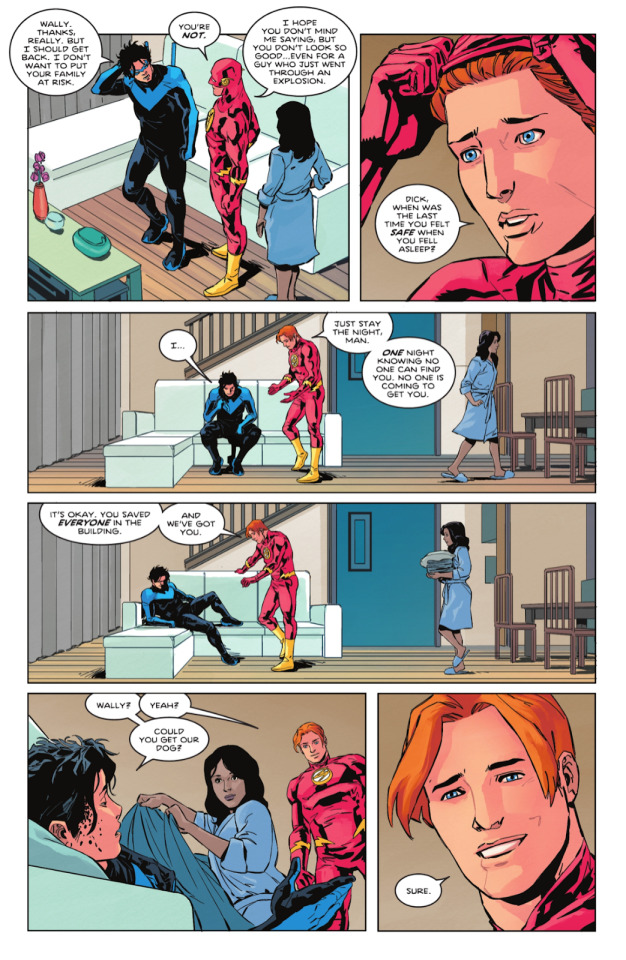
(Taylor, Tom, writer. Redondo, Bruno, illustrator. Get Grayson Act Three. Nightwing: Rebirth. 90, e-book ed. DC Comics, 2022. pp 16)
By comparison, when Grayson first wrote this same story nearly twenty years ago, she made it carry weight. She made it have consequences. While Dick was already coming apart from a myriad of different stress factors that unfolded on screen (overworking himself as Nightwing, as a police officer, saving Amy from Deathstroke, being fired from his job, Babs breaking up with him, and finally the circus fire), it was the explosion that made Dick fall apart, serving as the catalyst for his downward spiral. As Dick hunts down those Blockbuster employed, the readers get to see Dick’s exhaustion, Dick pushing himself to his limits, sleeping on fire-escapes while wearing his Nightwing uniform because he cannot bring himself to stop.
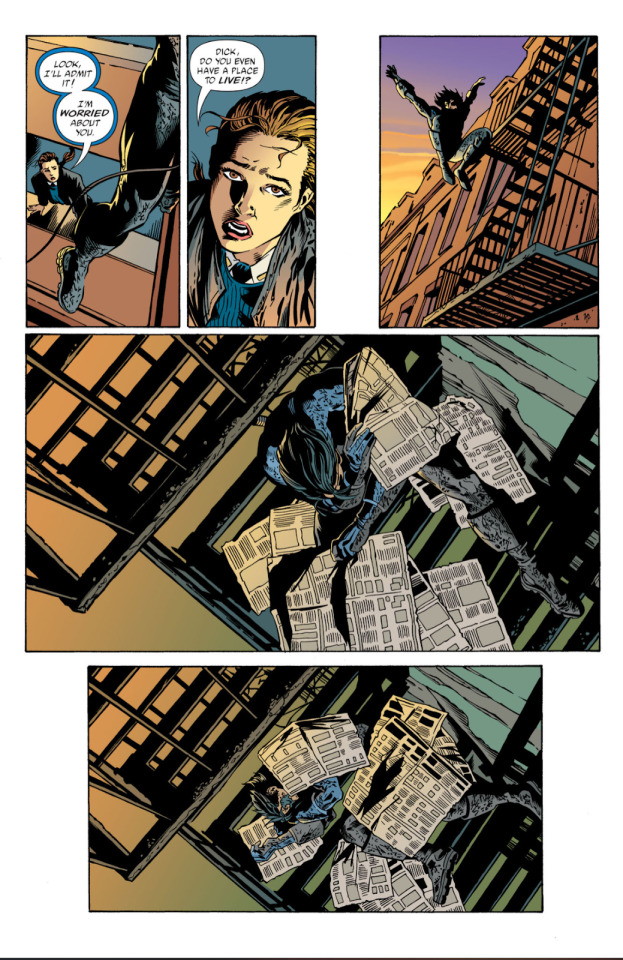
(Grayson, Devin, writer. Zircher, Patch, illustrator. Rekindle. Nightwing no 91, e-book ed. DC Comics, 2004. pp. 15)
Similarly, when the Judge returned to Bludhaven in The Untouchable, we see Dick keeping count of the bodies he left behind, we see Dick push through a bullet wound and beatings, we see him chase the Judge restlessly while neglecting his personal life. In both cases, we see the consequences of what Dick’s failure means, we see him struggle with those outcomes, we see what is at stake if Dick loses. And that, in turn, makes us not only care, but become invested in his success.
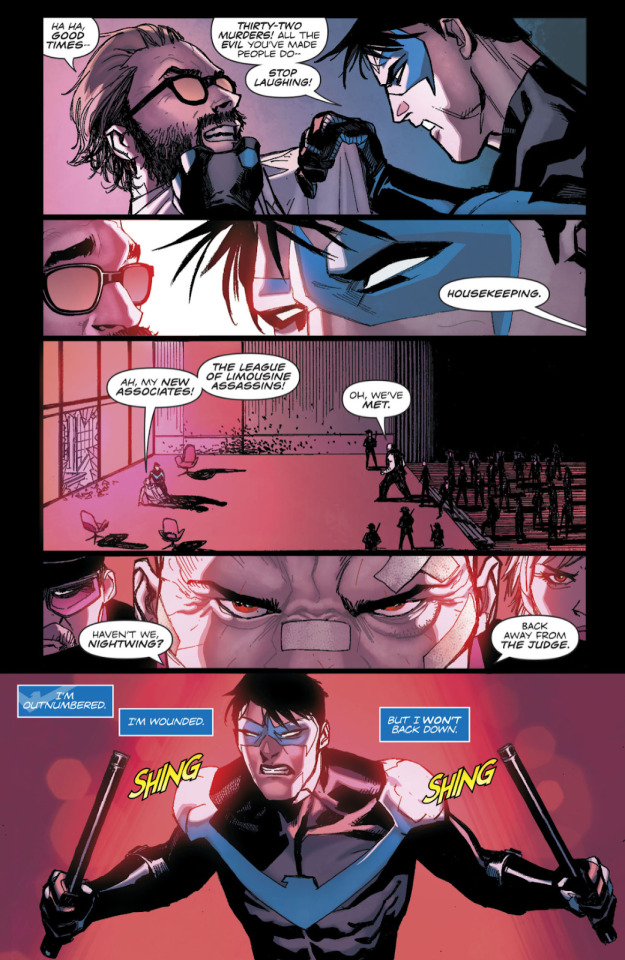
(Humphries, Sam, writer. Chang, Bernard, illustrator The Untouchable: Chapter Four: Infiltration. Nightwing: Rebirth no. 38, e-book ed. DC Comics, 2018. pp. 19)
By contrast, in Taylor’s run we never see any of that danger, and the few times we are presented with some threat, the conflict is handled with laughable ease. Blockbuster’s plots are foiled without Dick ever needing to do much of anything as he mostly relies on others to come to his aid. In this Nightwing solo series, the Titans, Batman, Robin, and Batgirl often do much of the hero-ing. Rather than putting the spotlight on Dick as a hero, Taylor lets others take the center stage, making this into an almost ensemble book. Because of this, the idea of Dick being near a breaking point, exhausted, and feeling unsafe wherever he goes is not supported by the narrative. By not giving Blockbuster a win, Taylor undermines the story he is attempting to tell.
This continues on through Nightwing #91. While Wally and Dick’s friendship were portrayed rather nicely, the villain that Taylor so ominously built up is taken down with an ease that is devoid of tension. The villain who is supposedly so good they’ve kept their existence a secret from Batman himself is quickly undermined by Taylor’s unwillingness to have his characters struggle.
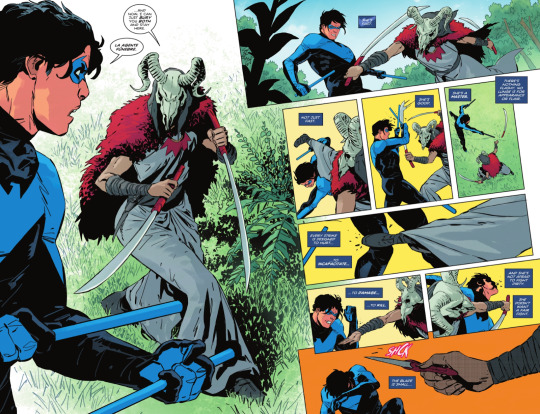
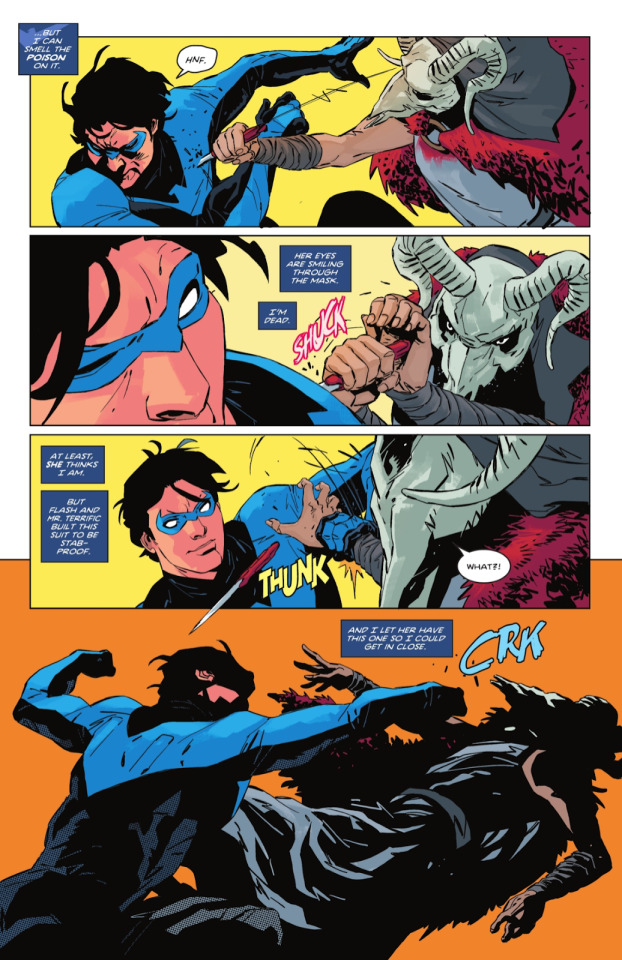
(Taylor, Tom, writer. Redondo, Bruno, illustrator. Get Grayson Act Three. Nightwing: Rebirth. 91, e-book ed. DC Comics, 2022. pp 16-17)
Besides the poor execution of his plans, however, it must be stated that Blockbuster’s plans and his motivations are poorly developed. Again, I’m not saying that Blockbuster needs to have a single sympathetic aspect to his character, but he does need to be threatening, and he must have some internal logic. Looking at the story Taylor has created, I wonder… Why does Blockbuster care that Dick Grayson created the Alfred Pennyworth Foundation? Why does he care about the creation of Haven? I understand that Blockbuster is meant to be a corrupt crime boss who wants to retain control of the city, but how does Dick building Haven interfere with his plans? Why was one billionaire throwing his money around to help homeless youths a bleep in his radar? Blockbuster already has politicians and the police force in his pocket while Bludhaven’s systems were constructed to benefit him and those who endear themselves to him. So why is he so focused on destroying Dick Grayson and not Nightwing?
I am trying to restrict my comparisons to DC Comics media, but in this, I cannot help but think of President Snow’s portrayal in the Hunger Games movie adaptations. In a movie-only scene, President Snow tells Seneca Crane about the importance of having a winner in the games. He explains how it is about letting the people have hope. As he put “A little hope is effective, a lot of hope is dangerous. A spark is fine, as long as it's contained.”
In other words, giving the people a spark of hope to keep them distracted can help prevent mass mobilization required to disrupt the system. Give them a goal to focus on, and you can redirect their attention. It would, then, be far more sinister and make far more sense from a narrative standpoint if Blockbuster allowed Dick to focus on his one project so that instead he would not turn his attention to Blockbuster. Perhaps he could have attempted to manipulate the project from within, folding it into Bludhaven’s corrupt social systems. Dick would have been that little spark that Blockbuster could have cultivated, giving the people of Bludhaven "hope" so that they would focus on that and not on what is going on behind the scenes. The narrative arc, then, would focus on Blockbuster failing to contain the spark as Dick became the flame that breathed true systematic change.
I do not want to dwell too much into fixes, as I merely wished to analyze Taylor’s run and not to go full on script-doctor and rewrite the entirety of his story. Rather, I just wished to use that as an example of how Blockbuster does not have sound plans or internal logic, and that, too, contributes to how his character comes across as incompetent and nonthreatening, and as a result, even his supposed ruthlessness is undercut.
Taylor’s Blockbuster does not have a concrete goal. He wants power and money, yes, but for what purposes? And how does he acquire said power and money? Why is he threatened by Dick Grayson’s personal project? How are his intimidation tactics challenging Dick in an interesting way? How are Blockbuster and Nightwing meant to narratively play off each other? How are Taylor’s Blockbuster tactics any different from a generic villain with any other name?
To be fair to Taylor, I do not believe Dixon managed to fully nail this part of Blockbuster’s character. I did not find Dixon’s writing of Blockbuster to be a particularly compelling part of his run. However, Dixon countered this lack of substance by leaning into what Blockbuster was meant to represent — the system inside the machine that allowed evil to flourish. Blockbuster’s influence may have been everywhere, but Blockbuster himself was hardly ever confronting Nightwing directly. Dick was fighting a war on multiple fronts, and while he could stop an enemy on his right, two more appeared on his left. The way the struggle between Blockbuster and Nightwing played out during Dixon’s run emphasized why protecting Bludhaven was so difficult — because there were so many immediate crises that needed to be dealt with on the surface, it was difficult to get to the root of the problem.
This was why, during Dixon’s run, Blockbuster could remain a threat even if he would remain unseen for long stretches of time. And this was why when Dick stopped one of the underlings, Blockbuster himself could remain an intimidating force. Blockbuster’s machinations were varied — some of his plans targeted Nightwing directly; others Dick only stumbled upon when investigating a matter he believed to be unrelated. Furthermore, the limited number of allies and the prospect that Blockbuster could only be taken down for good once his grip on other institutions of power and influence were weakened emphasized just how this was no ordinary fight, but rather a mission requiring Dick to operate on multiple fronts and strategize on a long-term basis.
Taking down Blockbuster was a multi-step process. Each of said steps offered their own challenges and opportunity for storytelling, for fleshing out Bludhaven, and for allowing Dick to grow as the protagonist of the story.
Dixon’s approach to Blockbuster requires Blockbuster to stay in the background, looming over the city as Dick fights his way forward. It’s why he remains present for all 70 issues of Dixon’s run without undermining Dick’s competence or his dedication to his city — as a stand-in for corrupt power, Blockbuster himself is not an immediate threat even if he is the powerful underlining one. Dick must constantly fight others in order to eventually be able to fight Blockbuster. To borrow video-game terminology, Blockbuster is the final boss, and Dick must first go through a myriad of levels and smaller enemies before he gets to finally take down Blockbuster for good.
It was Grayson who made the conflict between Dick and Blockbuster personal and, as a result, far more sinister. After the death of his mother in a car pile up caused by Nightwing’s activities, Blockbuster was determined to get his revenge on Nightwing. After finding out Nightwing’s civilian identity, Blockbuster came up with a chilling plan that was specifically made to destroy Dick from the inside out. Blockbuster understood that Dick did not value his own life, but rather, those of the people around him. And so, he decided that rather than killing Nightwing, he would instead kill everyone around Dick, tormenting and terrorizing him until he felt as if he were poisonous. What was so poetic about this strategy was that it mirrored what, in Blockbuster’s eyes, was Nightwing’s biggest sin: the danger he imposed on others through his actions which resulted in the death of Blockbuster’s mother.
As you can see, in this scenario, Blockbuster has become more of a proper character rather than just a stand in for corruption. That is not to say that wielding power for self-serving purposes at the expense of others isn’t a factor in his character during Grayson’s run, but rather that while Dixon’s Blockbuster was more of an embodiment of an idea, Grayson’s was more human, with more personal motivations. One approach is not inherently better than the other, they simply lean towards opposing sides of the spectrum, and that affected the type of story told and the type of confrontation Dick and Blockbuster had during their runs.
Because Grayson took a more personal approach towards Dick and Blockbuster’s dynamic, she also fleshed out their relationship to the point that it was not generic. Blockbuster’s campaign of terror against Dick was intimate, for it was something that could only have played out between these two characters. And while Dixon laid out the groundwork to build Blockbuster into a threatening figure by the time Grayson took over the title, Grayson’s strategy to have Blockbuster go after those around Dick allowed her to have Dick win and lose simultaneously.
Blockbuster starts his campaign of terror slowly. First, getting Tarantula to contribute to Dick and Babs’ breakup. While she is not the sole reason why they break apart — they are shown to have had some tension long beforehand that comes from incompatible personalities and desires — she does become a factor in their falling out. This ends up isolating Dick even further, who was already stressed due to the fact he lost his job once his boss and superior Amy discovered he was Nightwing.
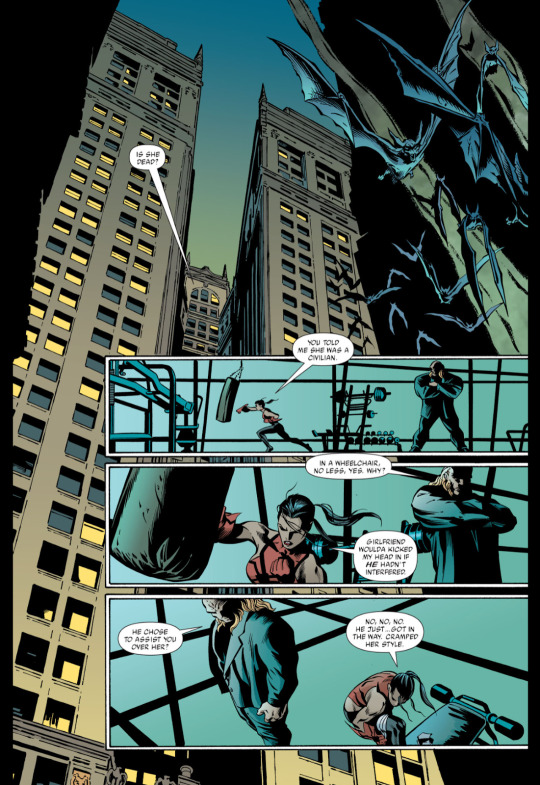
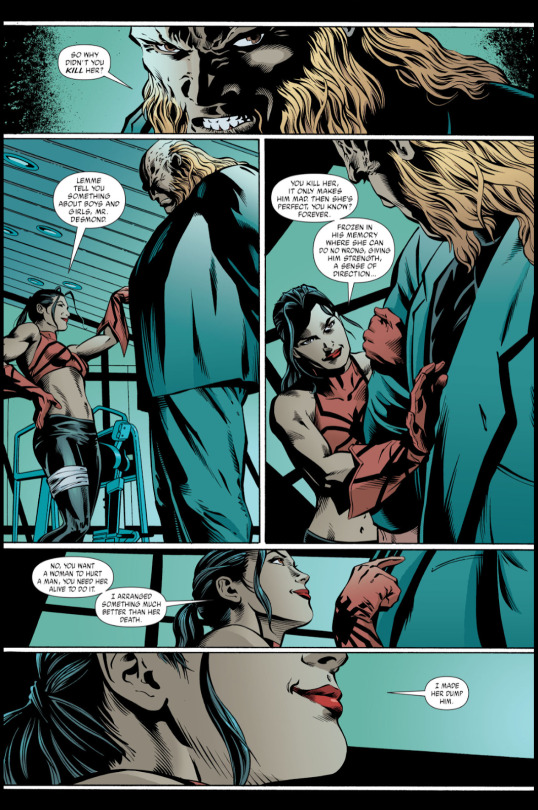
(Grayson, Devin, writer. Zircher, Patch Snowball. Nightwing. 87, e-book ed. DC Comics, 2003. pp 17 - 18)
Then, Blockbuster strikes closer to home by hiring Firefly to set fire to the circus Dick grew up in. While Dick was able to save many people who were inside the tent (and had his own life saved by Zitka), over twenty people lost their lives in this incident.
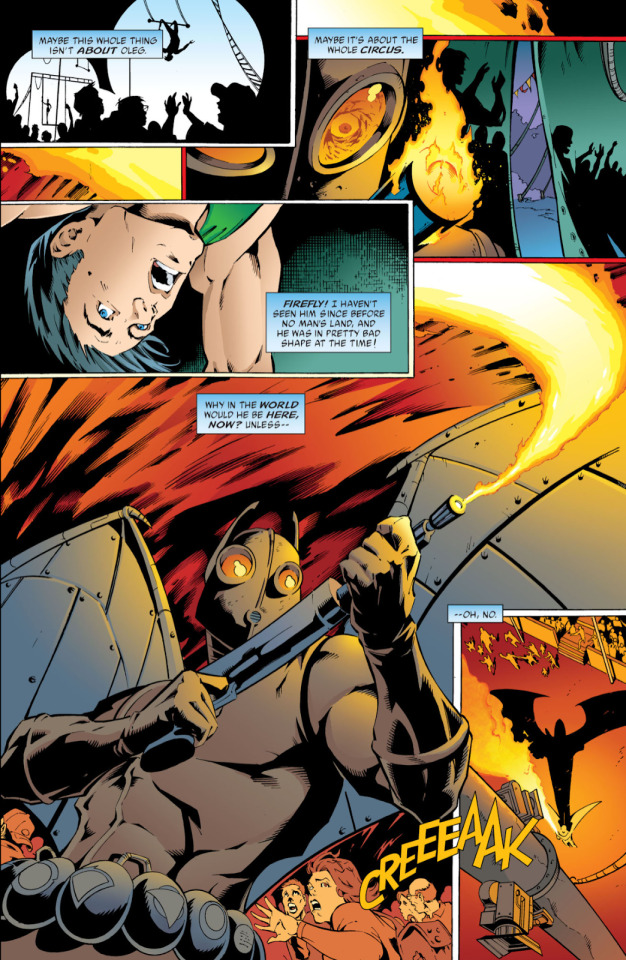
(Grayson, Devin, writer. Davis, Shane, illustrator. Flurry. Nightwing no 88, e-book ed. DC Comics, 2003. pp. 16)
While that certainly worked in breaking Dick’s spirit, it wasn’t until Dick’s building exploded that he realized this was a targeted attempt to get to him. All of those innocent people died not because Blockbuster was trying to kill Dick, but rather, because Blockbuster knew that their deaths would destroy him.
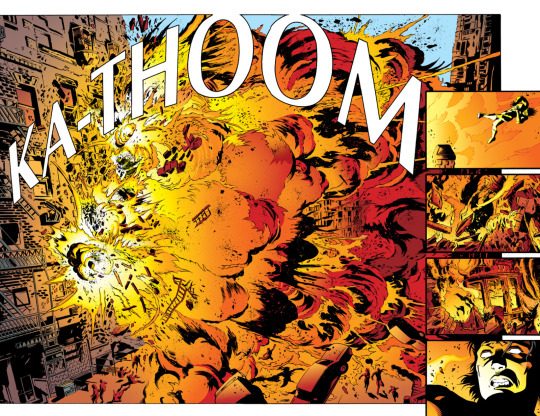
(Grayson, Devin, writer. Zircher, Patch, illustrator Avalanche. Nightwing no 89, e-book ed. DC Comics, 2004. pp. 12)
What follows is a downward spiral that demonstrates just how thoroughly Blockbuster is able to break Dick. Even as Dick gains new ground by taking out some of Blockbuster’s hired assassins, the threat still looms over him. And even when it seemed like Dick finally found a way to take down Blockbuster for good, that hope is snatched from him. The anger and helplessness Dick experiences in this moment truly speaks to the same feeling many of those who stand up against their oppressors feel whenever they are faced with setbacks in their constant battle.
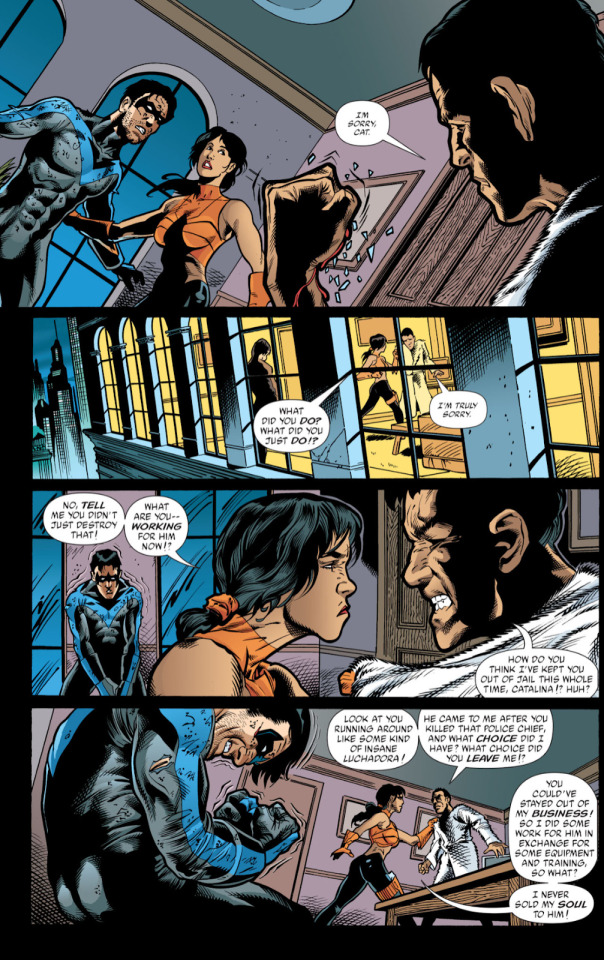
(Grayson, Devin, writer. Garcia, Manuel, illustrator Flashpoint. Nightwing no 92, e-book ed. DC Comics, 2004. pp. 21)
The carnage continues. The reporter who had uncovered Nightwing’s identity and just so happened to be standing next to Dick is mercilessly shot dead in front of Dick’s eyes.
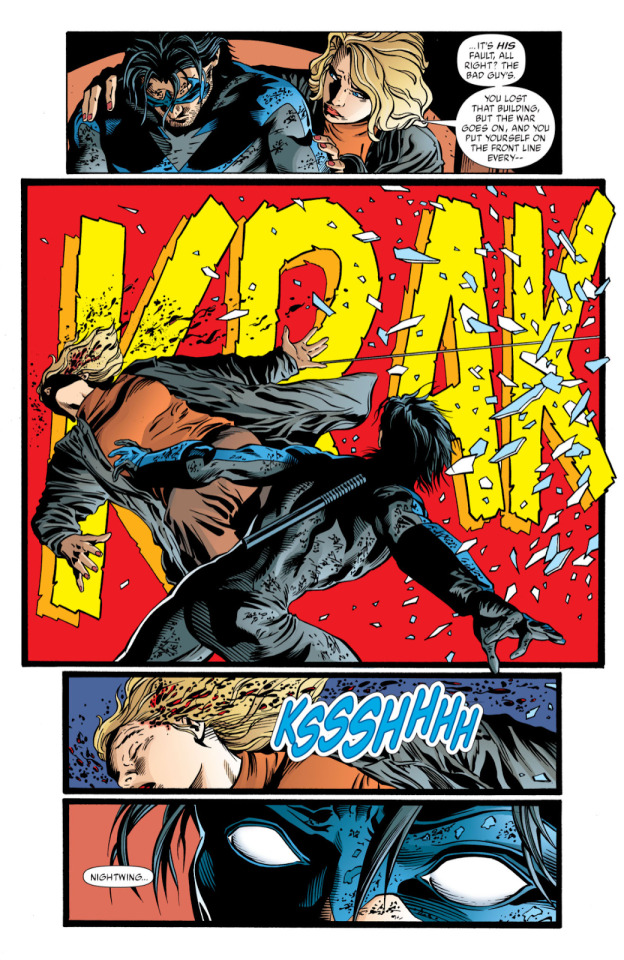
(Grayson, Devin, writer. Zircher, Patch, illustrator. Slowburn. Nightwing no 93, e-book ed. DC Comics, 2004. pp. 07)
And as Blockbuster chases Dick down, putting others in harm, we can see as Dick tries to protect innocent people around them that Blockbuster will not stop. He will not rest.
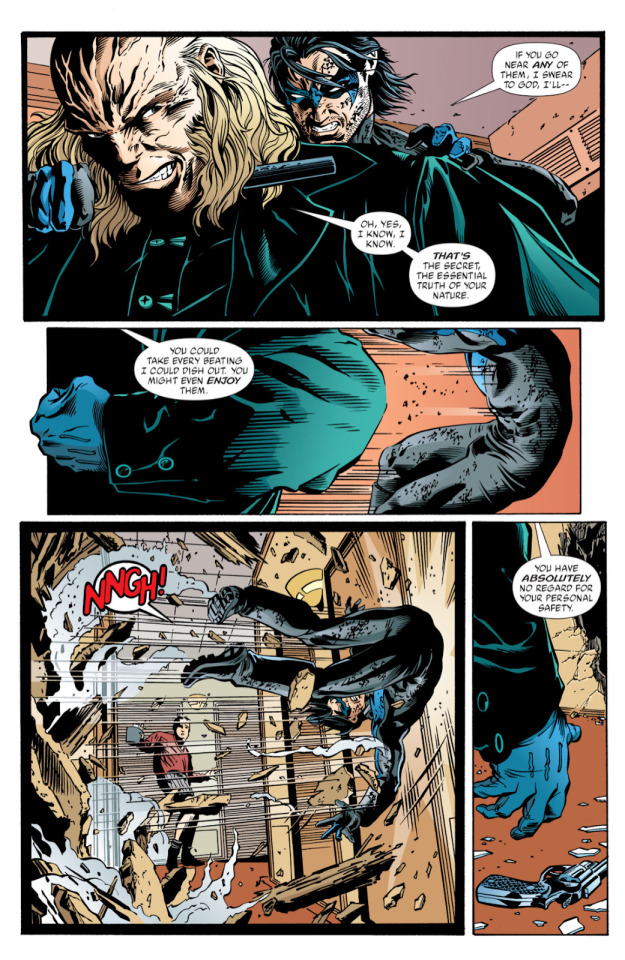
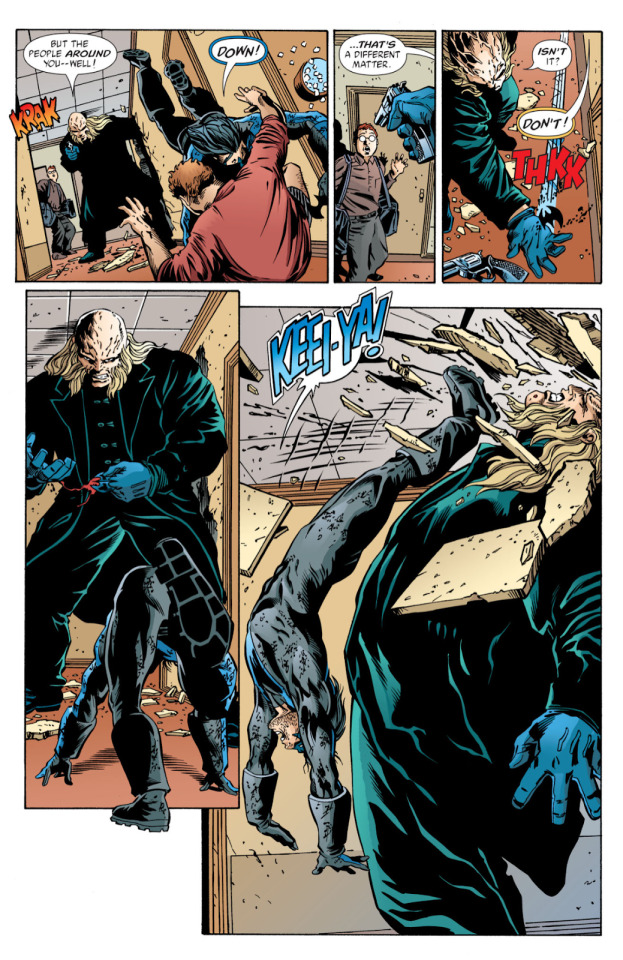
(Grayson, Devin, writer. Zircher, Patch, illustrator. Slow Burn. Nightwing no 93, e-book ed. DC Comics, 2004. pp. 10-11)
Blockbuster says it himself in a speech where he lays out exactly what his plans for Dick are. Dick is at a breaking point. The enemy, huge and impossible to overcome, towers over him. As the climax reaches its crescendo, Blockbuster asserts his power by mocking Dick and laying out a future in which Dick can never escape this hopeless terror. This city belongs to Blockbuster. Dick is powerless. There is no winning.
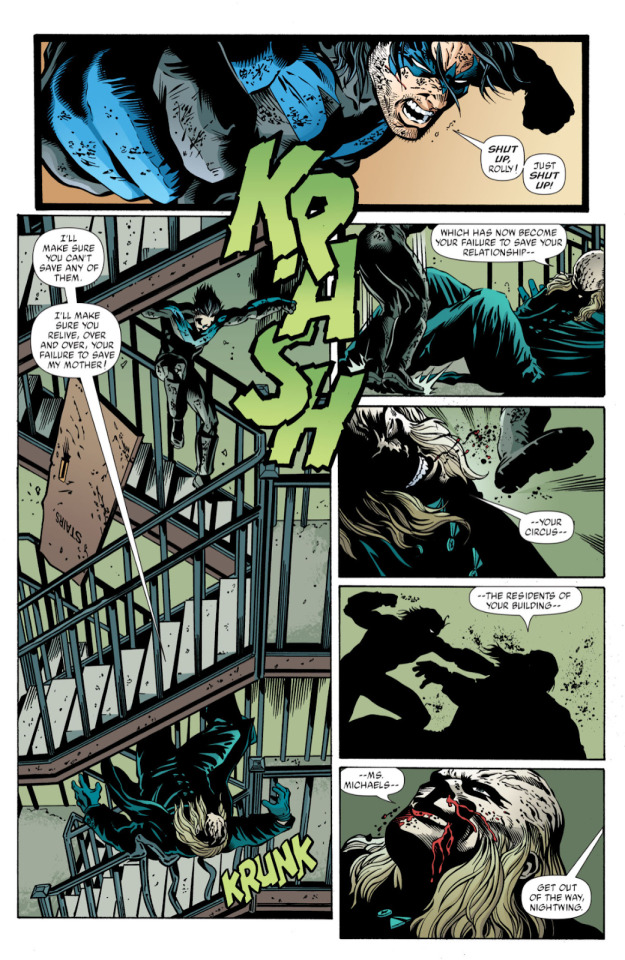
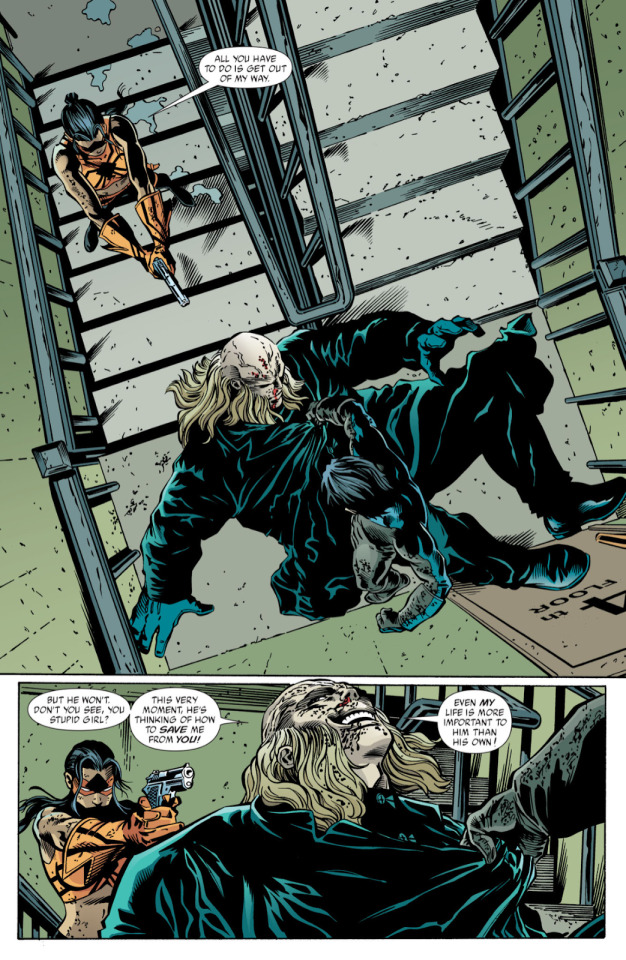
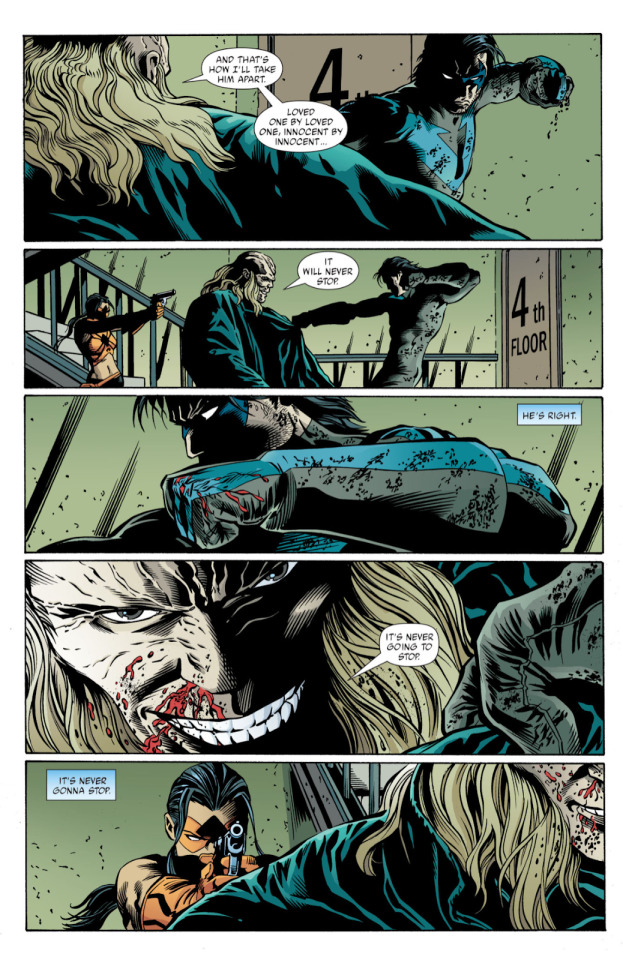
(Grayson, Devin, writer. Zircher, Patch, illustrator. Slow Burn. Nightwing no 93, e-book ed. DC Comics, 2004. pp. 13 - 15)
This speech is visceral. Personal. Evocative and filled with character and emotion. These words could not have been uttered by anyone else but Grayson’s version of Blockbuster. And they could have not been directed at anyone but Dick at this very moment. This speech has specificity that was purposefully crafted to raise the tension of this moment to its fullest potential.
By comparison, Taylor’s “I am this city” line is generic. Like much of his dialogue, it lacks character — nothing about what Blockbuster says feels distinctive to him. Nothing sets it apart from how other characters speak in Taylor’s world, and nothing about it is unique to this particular confrontation. Even the way he bangs his hands on the ground like a toddler throwing a tantrum (and resulting in Dick’s second unmasking in this run) is childish and undermines the tension of what is meant to be a climatic moment.
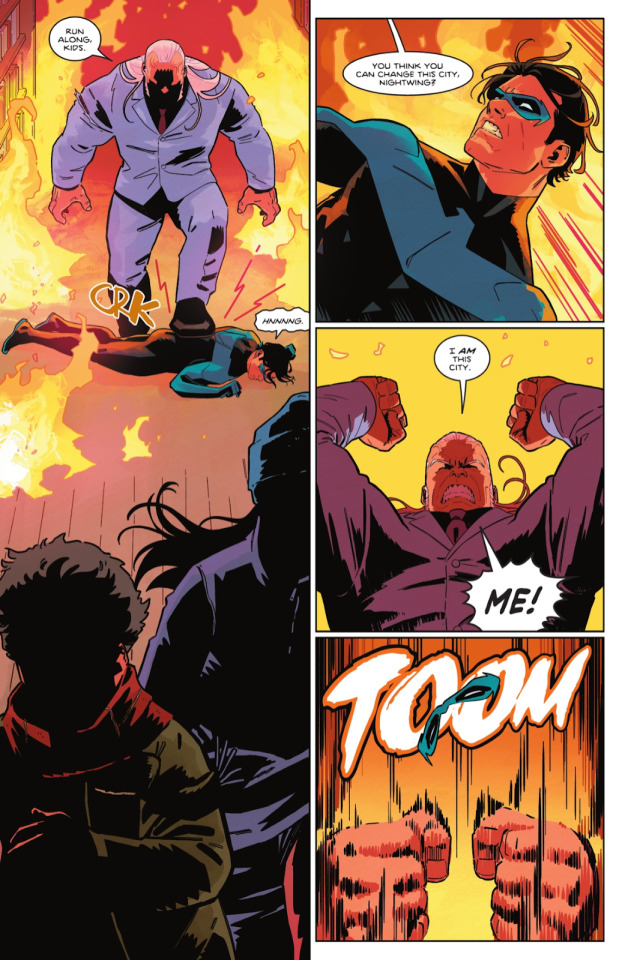
(Taylor, Tom, writer. Redondo, Bruno, illustrator. The Battle for Bludhaven’s Heart Part Four. Nightwing: Rebirth. 95, e-book ed. DC Comics, 2022. pp 20)
The themes in Grayson’s run are not the same as the themes in Taylor’s run. However, Blockbuster still invokes the threat of an oppressor. By isolating Dick from his support system, his terror and the helplessness it generates are intensified. Rather than making Dick question his own morality, he makes Dick doubt his abilities to be a hero.
While Dixon used Blockbuster’s intimidating build and power to explore the ways in which systematic corruption is responsible for the immediate evils we encounter in everyday life, Grayson used those very same characteristics to explore how one copes with being oppressed on a personal scale. Grayson’s Blockbuster pushes Dick to the darkest place he’s ever been, and the aim of her run was to see how he would be able to put himself back together again after he lost faith in his ability to make a difference.
Those two runs demonstrate how Blockbuster’s grip on power can be used to oppose Nightwing in two very different ways. Dixon’s approach requires Blockbuster to stand at a distance, the unseen machine that Dick will have to eventually destroy. This allowed Blockbuster to remain Nightwing’s main opponent for all 70 issues of Dixon’s run without ever calling into question Dick’s competence or his dedication to his mission as Blockbuster, the themes he embodied, and the struggle Dixon built clearly signaled that, no matter how great Nightwing was or how much he might wish to do so, the circumstances were not at a point where Dick could take on Blockbuster and succeed. By contrast, Grayson shifted Blockbuster from a long term, simmering threat to an immediate and personal one. This, though, also meant that the conflicts in Grayson’s run were more internal than those of Dixon’s. While Blockbuster was the enemy, the true antagonistic force that Dick would be forced to battle throughout Grayson’s run was Dick’s depression, his self-loathing, and his self-doubt. For this reason, rather than standing in the background while others did his bidding, Grayson’s run pushed Blockbuster to center stage. As he became an urgent threat who was costing people their lives every minute he roamed around free, apprehending him was no longer something Dick could afford to create a strategy around — it was something that demanded prioritization.
Nearly twenty years later, Taylor’s attempts to merge these two approaches only serves to lessen Dick’s competence and Blockbuster’s threat. Like Dixon, Taylor uses Blockbuster to represent, as it was plainly stated in his run, everything that is wrong with Bludhaven – the men in power who “have everything and still want to take more.”
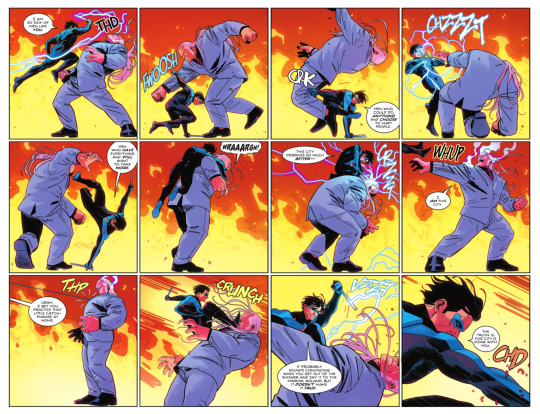
(Taylor, Tom, writer. Redondo, Bruno, illustrator. Battle for Bludhaven’s Heart Finale. Nightwing: Rebirth. 96, e-book ed. DC Comics, 2022 pp. 08)
And yet, it is Grayson’s plot beats that he copies by having Blockbuster personally target Dick in a myriad of unsuccessful ways.
While Grayson’s Blockbuster targets Haly’s Circus, Taylor’s Blockbuster targets Dick’s dog, Haly. While Grayson’s Blockbuster successfully kills Dick’s neighbors, Taylor’s Blockbuster fails to kill Dick’s neighbors thanks to Melinda and Wally’s intervention.
Because of this personal persecution, Blockbuster becomes Dick and his allies’ priority. However, because Taylor’s Blockbuster’s actions never have any negative consequences; because the humorous tone is always undermining the tension; and because the reader does not get see Dick struggle or fail against Blockbuster’s attempts the way he does in Grayson’s run, Blockbuster’s does not come across as the larger than life villain he is meant to be. Rather, his constant failures, his generic dialogue and unclear motivations, and his straightforward intimidation tactics make him more into a fumbling fool whose powerful position is incidental rather than the result of merciless oppression.
And yet, he becomes Nightwing’s priority. Thematically, Taylor’s Blockbuster is meant to imitate Dixon’s, but the narratively he acts like Grayson’s Blockbuster. This makes it so he is more of an immediate threat than Dixon’s villain, but less effective in his terror tactics than Grayson’s.
With the consequences of Blockbuster’s crimes being non-existent plot-wise, the stakes of the plot are never elevated. Blockbuster’s threat remains abstract because in Taylor’s run, everyone who is not an explicit bad guy has plot armor so thick that they cannot be forced into an uncomfortable on-screen situation for more than two or three pages at a time.
The clashing of theme and plot create enough of a dissonance as it is, but the presence of Heartless, who is actively and brutally murdering people and leaving children orphan, only deepens the problem. Heartless’ gory crimes not only overshadow Blockbuster’s failed assassination attempts, but the sheer amount of people who have fallen victim to his deeds creates an urgency and a tension that demands to be resolved.
Though Dick is aware of Heartless' existence, he does not make the serial killer his priority. When Grayson made Blockbuster’s threat more immediate and Dick became aware of the rising body count, stopping Blockbuster became his sole focus, to the detriment of his own health. Dick’s obsession with catching Blockbuster at all costs helped add to that intimidating aura around him.
Humphries understood this when crafting the dynamic between Dick and the Judge in The Untouchable. Heroes and their villains have a symbiotic relationship. When the Judge kills people in brutal ways, Dick jumps into action and stops at nothing until he catches him. This shows the audience that the Judge is a threat to be taken seriously, and it shows Dick to be a hero who will always put others first. When Dick fails to take the same approach with Heartless and instead focuses on Blockbuster, Dick comes across as an incompetent and self-centered.
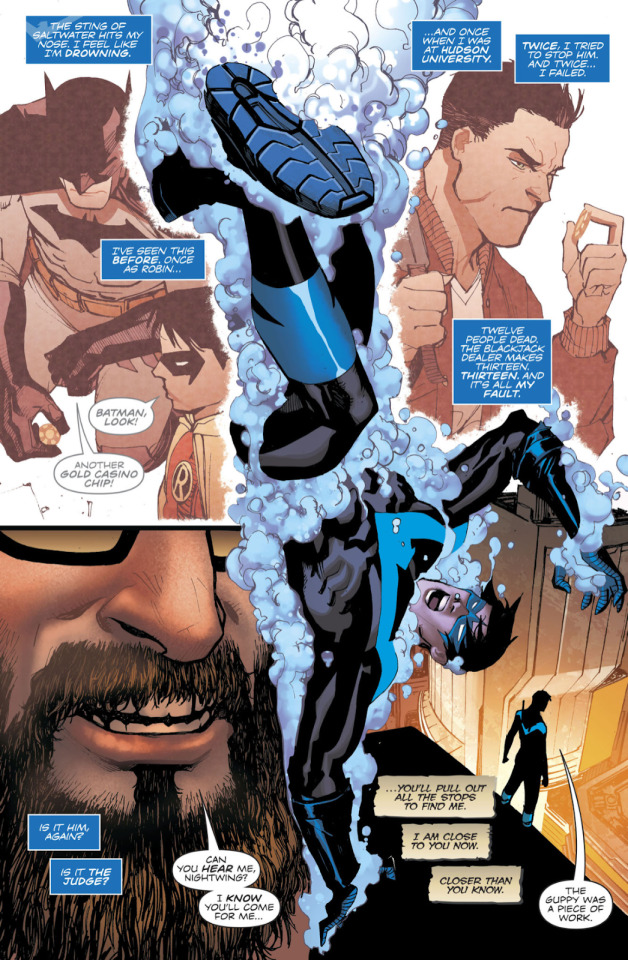
(Humphries, Sam, writer. Chang, Bernard, illustrator. The Untouchable: Chapter One: Hunter. Nightwing: Rebirth no. 35, e-book ed. DC Comics, 2018 pp. 20)
At this point, one might be wondering why high stake conflicts and ruthless villains are even needed in a Nightwing comic. I have seen many people defend Taylor’s writing by claiming that they enjoy the fact that it has no tension. They like the easiness of it, the slice-of-life nature of his storytelling. And while even his slice-of-life writing is not really my cup-of-tea, I can understand this sentiment. Taylor seems to truly enjoy writing the more sitcom-aspects of Dick and Babs’ life together. It is not the fights, the mystery, the intrigues, the nuances of living a double life that interest him — it’s the taking care of the rescue puppy, the sharing of a pizza in the park, the two childhood friends finally getting to live an idealistic millennial adult life together without having to worry about everyday problems like work, rent, family troubles, or disagreements. He thrives when writing stories that remain static, with simple episodic plots that never truly lead to character development or a change in the status-quo. He excels in quippy yet straight-forward dialogue where things don’t need to be taken seriously.
And to be clear, I don’t think that is a bad thing. I don’t think slice-of-life or sitcoms are a lesser art form than dramas or action series. Like many people, I too, have been comforted by that type of entertainment. I, too, find escape in those sorts of stories. I daydreamed about a life where I could just enjoy time with my friends without thinking about work, where the worst problem I face is how to avoid going to a party without appearing rude. Those stories have value, they have their place in our culture… But Nightwing's solo series is not that place.
Now, this will probably be the one of the most controversial things I will say in this entire essay, but despite my love for Nightwing, I do not believe that the Nightwing mantle is Dick’s ultimate true form.
In DC Secret Files: Nightwing Secret Files #1, Dixon explores the aftermath of Dick being fired as Robin by having Dick confess, with a certain amount of shame, that he always thought that he would eventually become Batman. Bruce understood that and he was preparing Dick to be his successor. Losing Robin, then, means losing any certainty Dick has for his future. Suddenly, he is adrift, not only having lost Robin, but also Batman. And that’s when Clark tells him the story of Nightwing.
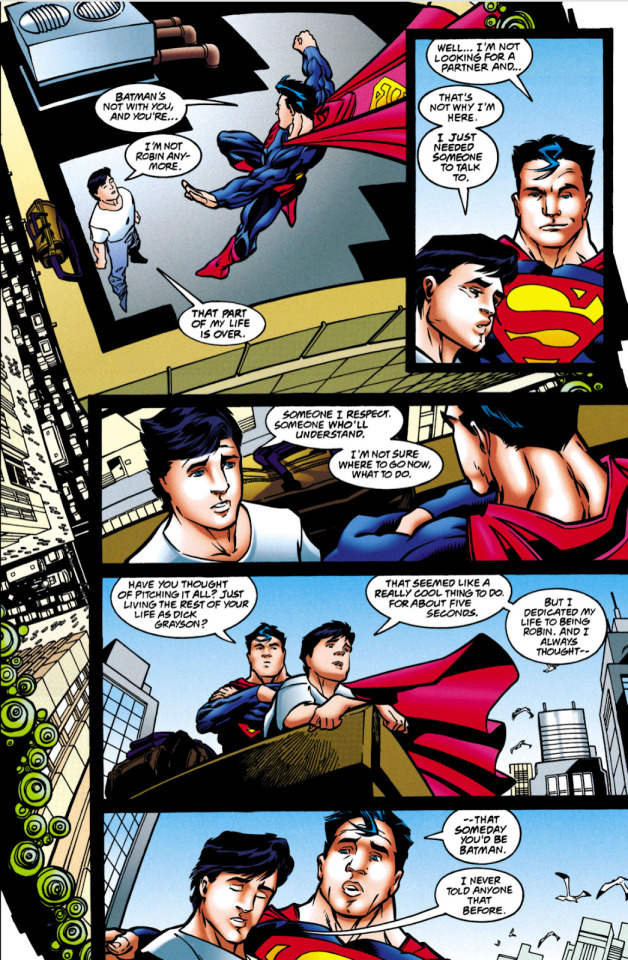
(Dixon, Chuck; Grayson, Devin; Peterson, Scott; writers. Ha, Gene; Scott, Damion; Land, Greg; Stelfreeze, Brian; Guice, Jackson; Eaglesham, Dale; Floyd, John; Jimenez, Phil; Brown, Eliot R.; McDaniel, Scott; Nolan, Graham; Rosado, William; Kuhn, Andy, illustrators. DC Secret Files: Nightwing Secret Files #1. DC Secret Files: Nightwing Secret Files #1 no. 01, e-book ed. DC Comics, 1999. pp 15)
Personally, I think there’s something really special about that idea. The Nightwing story grounded Dick during one of the most uncertain times in his life. Dick wanted Robin and Batman, but once both were taken from him, he created Nightwing as a way of coping with the trauma of having his identity, future, and certainty taken from him.
Braxi concludes his essay On Superman, Shootings, and the Reality of Superheroes by saying that “I don’t need Batman to end homelessness. I need Batman and Superman to provide moral and spiritual guidance to show us a better world is possible. I read Batman to transform trauma into will power.” (Braxi, Steve, “On Superman, Shootings, and the Reality of Superheroes” Comics Bookcase, September 2021)
The same, I believe, is true for Dick. As the character created to accompany Bruce and mirror him in as many regards as he foils him, Dick transforms trauma into power. He makes his own suffering a source of good.
As I said, I do not believe Nightwing to be Dick’s ultimate, truest form. I believe that to claim that Dick’s only happy ending is to have him be Nightwing not only diminishes the importance that Robin and Batman played in his life, but it also undermines what is so unique about Nightwing as a mantle.
Dick loves being Nightwing. Nightwing is an extension of who he is. But Nightwing is not the only happy ending Dick could have had, and to treat Nightwing as inevitable is to ignore the fact that Nightwing was born out of a trauma and a loss that could have been prevented had the circumstances that led to Dick losing Robin been different. Nightwing means transformation. He means change. Nightwing is a phoenix-like Kryptonian myth, raising himself from the ashes. But for the ashes to exist, a deadly fire must first occur. Nightwing, this great hero of light, can only be born out of pain. He can only arise from conflict.
This is one of the things that makes Dick so special. When he is overpowered, he does not give up. When he is hurt, he transforms that pain into power. No matter how many times he loses, no matter how many times he is lost, he always rises again, with a beautiful smile and an unwavering kindness that inspires others — including Superman, especially Batman — to do the same.
That is why a Nightwing story needs conflict. This is why he needs ruthless villains. That’s why a Nightwing story needs the occasional failure. Because it is only when we see Dick at his lowest that we also get to see him overcoming darkness, showing why he is the best of the best and why we love him so much.
38 notes
·
View notes
Text
BSD Fandom Groupthink
Note: At some point during this yap session I mention my dislike for the Atsushi and Lucy ship. This is not a shipping essay but it is mentioned, and I’m pretty blunt about it, so if that’s going to bother you please just scroll. I also mention Hisoka for like a sentence so TW
It’s very interesting to me how fandoms can shape individual opinions via groupthink. The first time I watched bsd, I understood the themes perfectly. I really admired Dazai’s character arc for his growth towards the light, and how he was able to use the harmful skills he learned in the mafia for good. I wasn’t exactly jumping for joy when his past with Akutagawa was revealed, but I accepted it as a necessary part of both of their character arcs. I didn’t dwell on that or him leaving Chuuya behind in the mafia, because I understood that his character was meant to be morally gray and that the bad things he does move the story along (same with characters like Mori and Fukuchi). I viewed the core themes of the story as overwhelmingly hopeful, to the point that it got a little cheesy even for me. And I want to reiterate that I had nothing but positive feelings towards Dazai
Then I get on TikTok and- *heavy sigh*. Then I get on TikTok and all I see are Dazai hate posts. He’s still the most popular character so I’m not trying to pull the “woe is me” card saying it’s rare to like him or anything. But I was genuinely confused because the overall attitude towards this character I had never even been mildly annoyed with was “ohmygod when will this gross bitch shut up.” I say gross because of the overload of jokes abt him not changing his bandages. It was basically the same post over and over again, even the guy’s fans couldn’t stand him. Granted, a lot of it was jokes, but the joke had gone to the extent that saying anything to contradict it was deemed a sign of poor reading comprehension. After all, they did have some credibility. Dazai has done a lot of bad things, so if you don’t hate him at least a little then obviously that means you support abuse
Now, as someone who was new to the fandom and wanted to fit it, I quickly conformed to this mindset. I felt bad for Chuuya because Dazai abandoned him, even tho before I entered the fandom I had never once paused to question how Dazai leaving impacted Chuuya. I acted frustrated with Dazai for abusing Akutagawa, even tho I had previously thought that was a very interesting plot point that added a lot to both characters. I slandered Dazai every time I talked about him, which confused one of my friends since she remembered me initially loving him. For a bit, I even called Chuuya my favorite character because that was more acceptable than saying Dazai (nowadays you get called basic for having either of them as a fave so me and Chuuya fans are in the same boat)
It wasn't until I found other Dazai fans that actually understood his character that I realized it was okay to stand by my own opinions. This sort of snapped me out of that hive mindset and made me realize that I'd been subconsciously changing my opinions to fit in with the fandom. It helped me to take a step back and to my own analyses, make my own assessments. I was able to disagree with Dazai defenders more easily than I initially could with the rest of the fandom because I felt encouraged to start thinking for myself again
I know what some of you are probably thinking, "Roxy, it sounds like you were just being a pussy," and I was. But the thing is, this wasn't usual for me. I joined the bsd fandom after years of doing my own heated analysis for other fandoms and priding myself on being different. So it's weird to me that bsd is the fandom that made me a sheep. I will say that the bsd fandom has an insane amount of discourse, more than other fandoms even, and they can't really handle other people having different interpretations. This is true of a lot of TikTok fandoms tho, and I got TikTok as I was getting into bsd so it could just be that I chose the wrong platform (Tumblr bsd fans are literally so much better I love ya'll)
Another moment of cognitive dissonance I had was with shipping. I don’t often talk about ships I dislike so if that’s going to offend you, look away now (I’ve given two disclaimers know pls don’t come for me)
When I first watched bsd, I absolutely hated the Atsushi and Lucy romance. I thought it was so forced, and that they were essentially the Chipmunk/Chipette versions of each other. My sister agreed with me so we just kind of made faces whenever they were on screen together. That’s not to say I hated either of their characters, I actually loved both of them a lot. Just not together yk
But when I got on TikTok…holy shit people defend that pairing with their lives. And no shade, I’ll always support people defending something they love. The problem is so many of the shippers followed the rhetoric of “we have to protect the innocent straight ship from the evil gay one.” It really rubbed me the wrong way and didn’t do anything to increase my enjoyment of the ship. In fact I don’t have many straight bsd ships for that reason, I don’t like how they’re viewed as the only healthy ones in order to put down the queer ships. This is coming from someone who’s a big fan of a lot of straight ships, I just can’t really stomach a lot of the bsd ones. At first I even viewed Tachihara and Gin as siblings but I got over that interpretation was I found out abt Aku and Gin being siblings. Nowadays, if I had to pick a favorite straight bsd ship it would most definitely be Tachi//Gin, I think they’re super cute
Got a little off subject there so onto the cognitive dissonance. Just like with Dazai, I pretended to like the straight ships that the fandom protected so dearly. I sought out edits and scrolled to the comments only to immediately find people bringing up rival queer ships for the characters…literally every single time. I looked at headcanon posts and scrolled through ship accounts to try and see the appeal. Then one day I had to take a step back and ask myself why I was looking at content for a ship I didn’t like. Why did I care so much about making myself like something that clearly wasn’t for me? My favorite ships were already the most popular, so wasn’t I already conforming? Why did I feel the need to conform more, when my personal ships weren’t impacting these people whatsoever??
This even led me to abandon ships I once loved. I dropped a Kouyou and Yosano fic I was reading because I saw so many posts about how the ship is lesbiphobic and shallow. This is particularly upsetting because femslash is obviously very important to me, and without Kou//sano I didn’t find a lot of it in the bsd fandom. Rest assured, I’m back to loving the ship, but it took me way to long to accept that I was allowed to like something other fans deemed problematic…which is a lesson I thought I already knew. I was a fucking Hisoka fan before I watched or read bsd, you’d think I would know a thing or two about unpopular opinions
I recognize that a lot of this is personal issues, I am a people pleaser to a fault. But since I’ve learned to stop this behavior, I’ve begun recognizing it in others more and more. Fans who repeat other people’s arguments when they haven’t done any analysis themselves. Fans who admit to pretending to like popular things just so they won’t get “cancelled.” Fandoms, especially the bsd fandom, having mass trends of hating on or loving one specific thing. And a questionable number of fans who seem to agree with everything the fandom says
Guys. You’re not gonna get cancelled for having a different opinion. Okay, if you like Mori you might (Mori fans I’m literally so sorry for ya’ll, you guys have it so rough). But guess what? That’s okay. Do not sacrifice something you enjoy or try to force yourself to like something you don’t just to appease strangers on the internet. It may sound small since we’re talking abt fictional characters here, but these habits will set you up for independent thinking later on in life. Professors and employers admire individuals who are able to think for themselves. People in general admire others who can think for themselves. Also fandom is something that should be fun, you shouldn’t stress yourself out over a difference of opinion. I got into bsd during a pretty vulnerable time in my life so it’s no wonder it took me awhile to strengthen my own opinions. If you’re a person like me who attaches the things you love so much to your identity, it can be hard to see people shitting on those things. You either double down or conform. Either way your harmless opinion has no tangible impact on anyone else in the fandom so it’s much better to stand by your own preferences
So the message here is don’t be a little bitch, develop a mind of your own. And also the TikTok BSD fandom sucks ass
6 notes
·
View notes
Note
Your take is your own, I see the reasoning, but I do kind of think the inconsistency was the point I supersons? Damian's capacity for handling emotional intimacy is strained and limited and the fact that he isn't consistent in his expression of affection, to me at least, kind of seems like the obvious result of that. Little boys with unhelpful role models for emotional openness can already be like that with their friends, today common, especially with that age pocket and especially when their feelings are intense and they don't have the tools to really communicate and rationalize them. Damian is an extreme version of that dysfunction, so him bothering Jon and being harsh and unkind one moment and devoted the next just kind of read like two sides of the same unhealed, immature coin. Also he's been raised by Batman. The modern Batman.
It just tracks with me experience with helping children manage their relationships is my point, so I wouldn't be willing to call that sloppy or unrealistic characterization.
I don't ... totally disagree.
But my point was more that if this was the point, it was never really treated as such. It was never examined. Damian never got a moment (again, in the Super Sons comics, I feel like that's really important to note because that's what I'm criticizing) of introspection, or at least so far he hasn't.
Obviously a thirteen-year-old boy isn't gonna sit his little friend down and explain all these big emotions to him, he's a child, he doesn't understand what's going on himself, but they do have adults in their lives and even if Bruce is too emotionally constipated to sit them down for a good talk, I don't think Clark or Lois are.
But Lois doesn't factor into this at all, unless we want Damian to degrade journalism for whatever fucking reason, and Clark, too, is written very inconsistently, at first wanting them to spend more time with each other despite Damian being an ass (and Jon giving as good as he gets), then wanting to seperate them because some freak from another timeline says Damian's gonna be responsible for Jon crossing a line in the future after the kid's proven to deeply care for Jon.
And I know this seems like I'm contradicting myself, because I just said I wanted Clark to keep SuperSons!Jon away from SuperSons!Damian but that only goes for the first five or so issues. After that, Damian does start having those sweet moments and Clark as a person is much more likely to foster those, despite any potential risks, than stamp them out by separating the kids.
But Tomasi!Clark is another rant. Or really not, he just often feels too angry and too soldier-y and I don't always like him.
There's good stuff in Super Sons. There's interesting stuff in Super Sons. None of it is ever examined. We can do that, sure, and we might get something neat out of it, but that's you putting in the work, not the author. Which is good to a certain extent, you should have stuff to think deeper about, implications and what not, a book shouldn't serve you everything on a silver platter, I just genuinely don't think Tomasi did this with that thought in mind.
He was writing The Fun Adventures of Superboy and Robin, and his Superboy's a sweet kid who won't take your crap and his Robin's a pretentious little ass who sometimes cares a lot and that's nice on paper but for me often fails in execution.
And, y'know, maybe I'm wrong. Maybe I'm too uncharitable. I'm just one guy and sometimes I'm an idiot.
In that case, agree to disagree (on Super Sons the Book), I guess, because at the moment, I'm not really willing to change my opinion on this. I've spent three days making a spreadsheet, my brain is kinda mush.
#bobbinasks#cer-rata#i do appreciate where you're coming from#and again i don't disagree with your points about damian#i just don't think super sons delivers on that stuff
4 notes
·
View notes
Note
Sorry for the confusion, what I meant was that I disagreed that Wei Wuxian's torture of Wen Chao was unjustified but agreed on all other points. And, yeah, as I mentioned, I think the novel is trying to convey how absolutely brutal and cruel his actions are, even if they are justified, and that's an important thing to understand when considering his character.
Also, I didn't know you were referring to people prioritizing characters over real people, which is just....why??? if someone feels a connection to a character, and they get some kind of enjoyment out of that, that's wonderful and people shouldn't come after them just because it doesn't agree with their interpretation. I mean, there are interpretations of MDZS that I think are more valid than others, and a lot of my issue is with people who read the novel but willfully ignore its themes. But Jiang Cheng being aro/ace is a valid interpretation, just as Jiang Cheng being gay is a valid interpretation. What we get (in the novel) is essentially that JC is not interested in women, which could lead to multiple interpretations. He's aro/ace, he's gay, he's too busy taking care of Jin Ling and sect leader business, he's scared to get close to anyone, etc., etc., etc. None of these go against canon and are perfectly valid interpretations. Also, even if they did "contradict" canon, there's plenty of coding and allegory in fictional works. If someone finds connection and comfort in a character, people should just leave them be. I'm sorry if I myself came off aggressive and wanting to argue, 'cause I really just wanted to agree with you about the MDZS fandom condemning other characters for their brutality while willfully ignoring our MC's own actions, but I do think that WWX's torture of Wen Chao is justified, even if it isn't right. But it most certainly isn't a "WOO! WE KILLED THE BAD GUY!" moment in the novel, even if we (and WWX) derive satisfaction from it. Also, I do think there is value in discussing different interpretations, but I mainly have an issue with how the fandom is so aggressive in trying to make WWX completely pure that they end up disrespecting his character and the themes of the novel, and especially the real people they're talking to. And, I mean, I also like to see him as pure sunshine boy when I choose to, but I can't understand people who put him on a pedestal while simultaneously condemning other characters for actions that are even quite similar to his.
Also, about my Xue Yang thing--- I don't think WWX would've turned into Xue Yang either, because WWX actually did experience happiness and family before his parents died, whereas Xue Yang never did (that we know of...I suppose he could've before he became a street orphan, but I don't get that impression). But Xue Yang's story clearly demonstrates that at one point he was naive and sweet, and he ended up so twisted and selfish specifically because he grew up an orphan on the streets, having to fight for survival against people who took advantage of him. If he had been saved by Jiang Fengmian like WWX was, it might've been an entirely different story. This is shown when Xue Yang actually is affected by Xiao Xingchen's kindness (he stopped the Night Hunts that resulted in Xiao Xingchen killing innocent humans), but at that point, it was too late. When Song Lan shows up, the progress is undone, because he'd already committed the crimes, and nobody is required to forgive him simply because he changed a little and stopped doing them.
So, I'm sorry if I came off kind of aggressive and rude, because I really didn't mean to, you just touched on something about the fandom that I have an issue with, and since I try to avoid the discourse, I really don't have any outlet. Didn't mean to actually start the discourse myself, lol. Thanks for your genuine reply, though!
Ask 1, Ask 2
First of all, I’m so sorry for leaving this ask in my inbox for so long, Anon… I wanted to answer properly and ended up psyching myself out 💀. But no, you definitely didn’t come off as aggressive and rude to me; in fact, your apology is what confused me lol.
Edit: I've deleted my response to "Wen Chao deserved it" since this isn't a conversation I can have in good faith. If anyone tries to discuss it again, I will just block them (not your fault, Anon)
3 notes
·
View notes
Note
Thanks for replying to my ask, I rather stay on anon just in case.
I still disagree with you. I don't see it as switching beliefs, they just didn't take part in the toxicity anymore and removed the discussion from their blog which is meant for entertainment. I also noticed you guys reblogged Mycroft's posts even though you wanted it gone? You guys contradict yourself constantly. Why? And how can you keep believing what you're believing if you don't go and see for yourself who they are on their blog? Did you even follow them yourself? I''m talking about john specifically because he's the one I interacted with the most. I'm sure you have ways to do so. You also say you didn't talk to them personally, which makes me even more sad and a bit angry. Sorry. We (four of us anyways, didn't talk to anyone else personally yet) feel you were (are) harassing him, not the other way around. You are bullying him, can't you not see that? You claim to talk about all the abusive techniques he's using, but you're actually doing it all yourself. We don't know how to make this clear to you and my guess is we never will. And no, I didn't mean we should bombard you with messages to harass you, but just so you know there are actually more of us who think this way.
But I get it, you stick to your beliefs just because it's hard to switch. I just feel very sad when I read everything you guys say.
For sure, I don't mind anon asks. I keep anon asks on so folks, like you, can feel safe in expressing themselves. However, if they get to the point that they are just nasty, it's within my rights to delete those. I answer these out of my own benevolence because this is my space and I choose what I do with it. My pinned thread isn't just for show.
Because I have already answered these questions, concerns, and gave directions to the wealth of information under the tag "a scandal in tumblr", I see no need to reiterate myself. It's redundant.
Again, if you read and comprehend all of my posts (including ones outside of the scandal tag) you'll see whether or not I have followed the rplayers and interacted with them.
And here at the end of your ask, we see what is called a backtrack and reversal. ( If you wanna know more about this technique/tactic, Google is your friend.) Specifically, taking what you firmly stated before and changing the meaning of actual words then taking what I said, ever-so-slightly twisting it, and rephrasing to suit your needs/wants.
Facts are facts.
🥨
If anyone wants to see the post we are referencing, it will be under the tag "a scandal in tumblr" and on today's date, March 12th
#a scandal in tumblr#🥨#sherlock#bullying is abuse#facts are facts#words have definitions#its like they try to redefine the english language#mental gymnastics
5 notes
·
View notes
Note
I've read your views, but I do not see why you call yourself a sysmed if you think the term is transphobic. That sounds like a contradiction of intent. I'm a trans system, so this feels like you're also transmed. I want to understand because your views otherwise meet what most pro-endo agree on.
I'm also a trans system, and that's actually part of why I call myself a sysmed. My time in syscourse has been incredibly painful and difficult, and a lot of it was because of that word.
I've been pro-endo for a very long time. It wasn't until I began to say a few things that were critical of the commnuity, just mildly, that I started getting called a sysmed. I got called one for every little thing -- having DID, having trauma responses, using Core to refer to my host back when we had one, NOT using Core to refer to my host back then, and so on and so forth.
Even now, the culture is to call anyone who disagrees with you a sysmed. Look at the most recent discourse on tulpa as a term. The majority of voices in the debate are pro-endo, and yet, almost everyone on the pro-tulpa(term) side has been calling them sysmeds, or spouting "sysmed rhetoric."
The fact is, sysmed simply means "someone who isn't pro-endo enough for my standards." Nothing more and nothing less; people use it as an insult more than the factual definition. I've been incredibly hurt by my own community forcing me out, so hurt that I even called myself anti-endo for a time and did say some hurtful things (after being pro-endo for years) because I was just so desperate for community.
Then, when I came back to the pro-endo community, nobody accepted me. Everyone still called me a sysmed, everyone still shut me out. It was only those individuals who were willing to look past labels and see my content that ended up sticking around, and those are the people who I found community with. Some are anti-endo, some are pro-endo, some are neutral -- but all are willing to look past labels and discuss like adults.
And that is why I use sysmed.
I'm pro-endo, fully and completely. I medicalize myself and my own disorder only. I only have the word sysmed tacked on because so many individuals have chosen to label me with it that I am preemptively calling myself that; if people try to argue with me by simply shouting that I'm a sysmed, I can now shoot back "Yes, we all know that, it's in my pinned post. Now actually tell me why my point is wrong, instead of attacking a label." It takes away the power of an insulting, often transphobic term.
It's the same reason I use it/it's pronouns on other blogs of mine (though I'm not as comfortable with them here). I have been dehumanized for so long that it became part of who I am. Same with sysmed. I do not agree with the ideology that led to the term, but because I use the term as an identifier, I can now work against that ideology without being hurt by the inevitable harassment.
You say my views are otherwise pro-endo. Yes! That's the point. If an individual cannot look past the label on a blog and see that they agree with the content -- just like how both pro-endos and anti-endos refuse to look past labels and see just how much they have in common with the others blogs -- then they have no place here.
#As a side note#It is very funny to me that sysmed is only transphobic in pro-endo spaces if it suits the argument#And by funny I mean frustrating#I've seen that argument be toted around a lot and it's never been not annoying#(Not directed at anon but musings about the topic)#pro endo#pro endo sysmed#syscourse
12 notes
·
View notes
Text
Normally I would have reblogged this to my Oz side-blog but I will reblog this here first because somehow there's more Oz fans here than on my Oz sideblog? Tumblr is weird...
Upon seeing this very popular post I have to add my two cents of a thoughts... Because while I agree with half of it, I disagree with another half, and it's mostly a question of nuance.
My main point is: It is not because people dump on Wicked that in return people should dump on Baum's Oz. I am saying that in regard of the "Oz originally doesn't have any continuity". I admit myself I am one of the first people to put forward the fact Baum was a bit of an anti-Tolkien when it came to Oz because at one point he didn't care about logical and coherent worldbuilding and just threw whatever he wanted at the wall... HOWEVER! I realize now how these words might mis-guide people because it doesn't mean Baum didn't care about continuity at all.
The early Oz books are actually trying to form a coherent whole. When Baum wrote "The Marvelous Land of Oz" he was not FORCED to do it because of "popular demand". He wanted to do it. Partially because he wanted to adapt it as a musical once it was over, but when he wrote the novel he still intended it to be a logical, continuing sequel to his Wonderful Wizard of Oz, and he worked to refit elements taken from his musical adaptations (like Pastoria) into the world of Oz as presented in his first novel. Same thing with the third novel, Ozma of Oz - when you read these first three books one after another they are cohesive. Just because later Baum decided to abandon a bit continuity and do massive retcons for the sake of telling new stories doesn't mean he never cared about continuity, and the start of the Oz series was an effort to make one complete world that made sense. Oz first became a series because Baum wanted it to be ; the whole thing of a "sense of duty towards the fandom" (which wasn't actually a sense of duty, his others works just didn't sell while everybody bought his Oz books) came later.
Yes, after the sixth book (which was meant to be the great finale but didn't work to end the series), Baum ended up making a LOT of books that openly contradicted the worldbuilding established in the first novels... But they still were coherent and cohesive in their own right. It is just that Baum chose to retcon and massively shift some worldbuilding rules in order to have a setting perfect for a kid-friendly long-running series where he could include everything and anything - but once he established these new rules, he stuck to it and explored them in various ways (such as the rule of "No living being can die in Oz", which of course contradicts the early books, but becomes a core principle of "later Oz" and is explored in various novels - such as the one introducing the Tin Soldier). Yes Baum contradicted, shifted and retconned, but to say he had no sense of continuity or canon is frankly way too harsh.
We were having a talk with @themousefromfantasyland about Baum's The Life and Adventures of Santa Claus novel, and he did make a point that this books contradicts the "anti-Tolkien" reputation of Baum as in there you have a strong, solid, complex worldbuilding working very well for its own little Christmas epic, self-contained in one sturdy novel. And that's the thing with Baum: outside of his Oz series, each of his individual works had a strong and solid worldbuilding, or nice continuity in the case of mini-eries. Oz was an exception just because it went on for way more than what he already planned, and Baum had to juggle between various media (the Oz franchise he run wasn't just novels, it was also stage musicals, movies, and even early comic books).
My second point is this: I do agree people shouldn't entirely reject Maguire's novel out of it being "non-canon" to Oz. Because it is part of a long series of revisionist works inventing, reinventing or twisting Oz in various ways. The MGM movie was first, but you have so many, from The Wiz to Emerald City, passing by Tin Man, or Lost in Oz, or to have something more akin to Maguire's 90s dark, edgy, sex-and-drugs counter-culture approach to Oz, the Oz Squad comics. HOWEVER! HOWEVER! I do think it is important to remind people Maguire wrote his own thing, on his own side, and that "Wicked" is its own thing.
What do I mean by that? Very simple... I have seen, looked at, chatted and interacted with a concerning number of people who are convinced Wicked (be it the musical or the novels) are "canon" in the sense that... somehow they believe when Maguire named his Wicked Witch of the West Elphaba, it retro-actively baptisez the Witch of the West in Baum's novel. Or that the Wicked musical was actually allowed or produced by the MGM as an "official" complement to their movie, meant to act as a real prequel to it. You should not underestmate how POPULAR Wicked was compared to other Oz revisionist works or adaptations, resulting in a lot of people ending up knowing only the MGM movie and the Wicked franchise, sometimes with Return to Oz, and not knowing anything about the novels. This results in fascinating though very puzzling misconceptions. I have seen people insist that Evillene in The Wiz should be called "Elphaba" because it is the "official" name of the Wicked Witch of the West. I have seen people claiming to adapt the Wizard of Oz by Baum but really just doing adaptations of Wicked the musical, and not realizing they were using tons of stuff that were copyrighted by the musical creators and not in Baum's original novel. I have seen a lot of people claim that Baum intended Glinda to be called "Galinda" and that it is more correct to refer to Glinda by this name...
Yes, Wicked is its own continuity and branch of the large Oz family tree. Just like the MGM movie and its various adaptations. Just like Disney's Oz the Great and Powerful, or Return to Oz. Just like the Wiz. Just like Volkov's Tales of Magic Land (well... cough cough there's a bit of more unclear legal things down there but you know). Just like Tin Man or Emerald City. People should be aware that Oz is a LARGE franchise of many, MANY media.
But there is also a frightening amount of people who take literaly what Maguire wrote: "it is the real story of the Wicked Witch of the West", they take it literaly. Mind you this was more prominent in the 2000s and early 2010s - I think things got better recently because people are getting much more aware of the original books and of other alternate Oz media... But you know, at one point there was a need to point out "Hey guys, you know Maguire invented stuff, right? That he is basically parodying and twisting stuff and creating his own thing not in the public domain? Please stop saying Elphaba is public domain, she is not. This little wrinkled one-eyed hag is."
I've seen a lot of people lately harping about how "Wicked isn't canon to the Oz universe", "it's just glorified fanfiction", etc., and I can't express how silly that is, and how annoyed it makes me every time I hear it, lol. Baum's original Oz books were never meant to be some canonical series — they contradict each other constantly; Baum called it a "fairy story" with loose cohesion at best; and it only became a series at all because the first one got popular enough that Baum felt a duty to the fandom to keep making more (even after he had wanted to end it). And the 1939 film is every bit as much "fanfiction" as Wicked — it changes the story in both major and minor ways, including a complete shift of framing (i.e., making Oz into a dream rather than a real place).
Maguire's great contribution to the overarching legacy and lore of Oz was to harmonize the very weak "canon" of the older works with a different shift in framing: recontextualizing all of the prior Oz material as a revisionist history (going off of Baum's own idea framing of himself as a "Royal Historian of Oz"), and attempting to tell "the true story" behind the other works (fictively of course — we're never meant to literally think Maguire's version preceded Baum's, irl). In literary studies, this is called an urtext. The Wicked Years and its adaptations are as much "fanfiction" as the 1939 film: it's just self-aware of that fact in a way that earlier works weren't, and uses that perspective to deconstruct the material and explore deeper (and darker) themes — not simply adapting or reimagining the original text (as the 1939 movie did), but actively challenging it; interrogating it. It's not meant to be "canon" as such: it asks you to ask whether (and why) there is such a thing, and what that might say about the stories that we are meant to literally believe in, in real life.
2K notes
·
View notes
Text
Ok, so I have a BA in English, and whether or not that was a worthy investment is yet to be seen. What I do know is that I found my studies both fun and enlightening and they changed the way I interact with media, language, art, politics, and the world at large all for the better. I think everyone would benefit from the soul-nourishing qualities of this kind of education, but it's a privilege that most people don't have the means for (including myself, I'm in quite a bit of debt over it...)
To compensate for this at least a little bit, I compiled a list of crucial essays that I believe form a solid foundation for this area of study and are widely applicable to many other studies as well. These are the essays that were assigned time and again or at least referenced by many different professors that I had, and which I consistently draw from. (There's also a couple of things I found on my own and would personally include in a curriculum if I were a professor). I tried to find free versions of as many of these as possible, and if they're part of larger bodies of work I made sure to list that as well so that you could try to find them at your library. (Please check them out if your library has them!)
I think if you read through each of these, and especially if you read and discuss them with other people, you will basically end up having completed your own, self-guided study in English/literature. (If anyone sees this and thinks I've forgotten a crucial text, let me know, I will keep adding to this as I think of things!)
Essential Reading for a DIY English Degree
"Why Read the Classics?" by Italo Calvino (published in an essay collection of the same name)
"How to Recognize a Poem When You See One" by Stanley Fish
"The Ethics of Reading: Close Encounters" by Jane Gallop
"Skywoman Falling" by Robin Wall Kimmerer (published in Braiding Sweetgrass)
"The Carrier Bag Theory of Fiction" by Ursula K Le Guin (published in Dancing at the Edge of the World)
"Some Notes on Organic Form" by Denise Levertov
"Playing in the Dark: Whiteness and the Literary Imagination" by Toni Morrison (published as a book of the same name)
What is Found There: Notebooks on Poetry and Politics by Adrienne Rich (full book) (Here is one of the essays that is freely available online)
"Art as Technique" by Viktor Shklovsky
"Fascinated to Presume: In Defense of Fiction" by Zadie Smith
"Against Interpretation" by Susan Sontag (published in Against Interpretation and Other Essays)
Notes:
You probably won't fully buy into every single one of these texts. In fact, a lot of them will probably contradict each other. That's okay! Take the time to consider each one. Identify the points where you disagree and try to formulate why you disagree. Identify the ideas that resonate with you, change your perspective, or blow your mind; collect them and keep them in your toolkit moving forward.
I am limited by the fact that I'm American, attended an American program, and studied mostly English-language literature. Some of these may not be as relevant for other nations, cultures, or canons. This list may also have blind spots. Feel free to comment/tag with recommended additions -- even if you think they would only be relevant to your country or culture! All of it is enlightening.
1 note
·
View note
Note
Again you're adding "especially" because it makes you sound less like the tantrum throwing child that you are, that isn't what was said at all. And no, it is in no sense exclusionist to specify one group in a positivity post, and that's not a "real issue" like you claim to care about. There's no real "logic" to what you're doing, you just want to kick up a fuss about anything and everything that you don't think is morally perfect or doesn't center you specifically.
And again, you are not the only person on the planet. You are also not a wheelchair user and have no idea what it's like to be one or what issues wheelchair users face. Go back to Reddit where at least you'll be annoying people like yourself, instead of harassing people trying to talk about their oppression because you think that anything that isn't about you isn't real.
Right so if it's not exclusionary to take an otherwise more supportive sentence and directly narrow the scope of it by adding an extra qualifier where it's completely unnessecary, what would you call that? Btw?
Also we literally just covered the fact that I'm calling out shit that is directly about me
Anyway, how close are we to the part where you start misgendering me and telling me to kill myself? All your friends have done it and after all you read my post that says "I'm not on here to fight, I want to look at memes" and went "HA! I know better what this person wants than they do, I should go harass them and drag them into one of those fights they explicitly said they don't want, over issues that I don't understand!"
But please, tell me, do you agree with the posts I called out?
Do you agree that all of american pop culture is designed specifically to hurt intersex people?
That no one in the queer community other than other trans men will believe them about their dysphoria?
Or are you just arguing because me pointing out blatantly untrue and patently absurd things has made you insecure about your own blatantly untrue and patently absurd beliefs?
Or you think it's just oh so awful that someone wouldn't believe massive sweeping claims on someone's word alone despite it contradicting all evidence and statistics?
Oh and about that whole tantrum throwing child, you wanna explain what part of what I'm doing is that? Or are you just throwing around insults because it makes you feel tough, because you have nothing productive to say and just want to hurt other people for disagreeing with you on the internet
I tend to stay off reddit, because it has a shitty atmosphere, and I'ad vise you do the same, as if this is your reaction to someone saying "Hey that doesn't actually happen" or "Hey specifically adding a word that wasn't nessecary to narrow the scope of a support post and exclude certain people from it is... narrowing the scope of the post and excluding certain people on it" and if I am "breathtakingly" bigoted, pretty sure you'd explode there, or like, actually talking to just about anyone in real life
Do you have any idea how sheltered it makes you seem that I am your standard of "breathtakingly" transphobic? Do you have any idea how hard that makes it to take you even slightly seriously? You have people out here advocated for the genocide of trans people, calling them evil mentally ill perverts preying on children, but no, I am "breathtakingly transphobic" for... explicitly saying I support other trans people but that doesn't give them a pass to blatantly lie or exaggerate things? Because nothing does?
Go outside man, go see the world and grow thicker skin, "breathtakingly transphobic" that's... honestly genuinely funny
0 notes
Text
first.
I miss feeling like a good person
I think I haven't done anything completely unforgivable, and like a normal human, I've made countless mistakes. Small or large, everything could be forgiven by myself with the right mindset. I hold people to that standard, I think most should be given a chance to grow. It’s so corny but kindness is free, and so is hatred, but it’s unbelievably tiring. Hate is a strong feeling, something I’m familiar with. To me, however, it feels miniscule in moments where everyone is all joyful and carefree, despite any kind of rivalry they may have with each other. The warmth I felt watching a group that never fully got along cheer and face the entire world together blurred out all other moments where I wished I never met them. It quickly got replaced with something burning, a sign where I knew I was close to crying just because of how genuinely happy I felt. Afterwards, I felt hollow and regretful I spent months harboring a grudge against all when it could have been spent differently.
Some have wronged me and many others, some had disagreeable behaviors. Had I consulted someone with this rant’s words, maybe they would have reassured me and justified whatever negativity I felt towards them. But maybe the reassurance I need the most is one where it opens a path of reconciliation and a chance to be lifelong companions to trust for eternity.
Admittedly, I’m stubborn and refuse to take the high ground because I saw it as being weak and giving up. Had I done just that, however, maybe things wouldn’t be as difficult as it had been.
Though, I’m exhausted of being harmed too, of pleasing other people just to have it easy for myself when I’m not okay with it at all. Hatred, in a way, gives me an identity. A reminder that I’m still a person that is deserving of something. Someone who has their own opinions and thoughts and not just a personification of compliance.
But, an identity could be formed from being both stubborn and taking the high ground too. From being both weak and strong. No, that is the basis of identity. Everybody has weaknesses and strengths, it’s there no matter how covered it is.
I’m lost on where I’m going with this at this point, but all feels connected somehow, even with how off the track this is. Aimlessly drifting and experiencing everything that I’ve ever had has formed me into the person I am now.
I miss feeling like a good person, the flaws I’ve shown and mentioned should be embraced and improved, but there is something that’s keeping me from going through with improvement. My soul feels tainted by mistakes I’ve made, no matter how long ago it was or how small of an impact it had. I hold distrust when people label me as kind or sweet, when I know I’ve done things that contradict those words.
If anything, they’re a good person for seeing me as one too. I’m undeserving of such a view, and I tell myself that I’m stubborn, that I should push away all thoughts accepting I’m exactly what they say.
I confuse myself a lot, I think I’m filled with traits and beliefs that clash with each other, but I know this one. I felt fulfilled indulging in that very perspective others had for me and in seeing the effect I had on them, how they said everything was better when I was there. How they said they were glad meeting someone like me when I was a complete poser then. Fake it until you make it, I felt happy in making others happy when it was not my initial intention at all. That was back then, the feeling dimmed now, but maybe I could try again.
To repeat, kindness is free, hatred is satisfying but being at glee and peace is better.
Today, I will be a good person, and then I will learn to feel like one again
1 note
·
View note
Note
Spreading rumors? What rumors are we “spreading”? And what lies? And we cherry pick? Really?? When Cockles fanatics decided to make up bullshit about Misha having a near-identical ring to Jensen and decided they were secretly in wuv despite no evidence at all. Oh, except from Misha, who lies on the regular and provided no evidence.
Right.
Look, anon, we “associate” with all sorts of people. Yes, anti-Jensens, yes, pro-Jared’s (who can be indifferent to Jensen), even Wincesties. I haven’t found a pro-Destiel blog that isn’t irrational and aggressive, but I’m sure they exist.
We associate because that’s how we all learn. I didn’t realize the pro-Jensens were excusing his bad choices and demonizing Jared until I found the actual truth—from an anti! And how did I know they were telling the truth? Because when they made that statement that contradicted the other statement, I had to do the research myself!
Example: The Winchesters. Jensen didn’t buy the rights. He owns nothing of Supernatural, not even the character Dean. He got and was granted permission from WB/CW to play in their playground. He got Robbie Thompson on board. He asked for Kripke’s blessings (not required but a common courtesy you should always do). And then…. Didn’t tell Jared. Kripke assumed he had, and when he found out Jensen didn’t, he deleted his tweet. Why would he do that unless he realized Jensen goofed big time? This string of thought made a lot of sense to me… and I never would’ve discovered it unless an anti pointed out that there was no way Jensen could’ve bought the Supernatural IP. He’s well-off but not that well-off!
Does that mean I hate Jensen? Or that we hate him? No! Just acknowledging his flaws, his humanity! Realizing and accepting he made mistakes! Why is that such an awful thing to do?!
Also, “cherry picking” what he says isn’t us lying. You disagree, cool. We disagree with a lot of what Hellers and Cockles fanatics say too. The difference is we aren’t going into their anon ask box and harassing and attacking them!
You know what we do? Genuinely, what we do? We scroll on by, block if we have to, and leave others alone. I do the same when I see one of my associates post something I disagree with—I just scroll on by. I don’t live in an echo chamber of self-soothing.
Try it sometime.
You don’t have credibility Because you guys make up lies about Jensen all the fucking time.
Just fess up you are not a fan of Jensen. I’m not talking about criticism because criticism is different to hate but associating yourself with people who are known to make up lies about Jensen proves that you are not a fan.
You also cherry pick what he says. Not liking his friends is one thing because you don’t have to like his friends or family but cherry picking and making up lies about him shows that you are not a fan. Also j2 fans and jp fans lost all their credibility when u started making up harmful rumours about him and ignoring everything he says that you don’t like.
What are these lies and rumors my friends are making up about him?
Not that I have to defend my associations to you, but I’m going to say this to make a point. Yes, I am a Jensen leaning J2 fan, and yes, I associate with some known Jensen Anti’s.
Something people in this world seem to have forgotten is that you don’t have to only associate with like minded people. We have mature discussions, share facts and resources, and respect each other’s opinions. We don’t demean each other because we don’t feel the same about something. I may not always agree, but that’s okay too.
When you box yourself in to only hearing what like minded people have to say, you lose the ability to think objectively.
I’ll respect the opinion and have a conversation with any person in this fandom as long as said opinion is not disrespectful and hateful yet has no facts to back it up, and the person isn’t coming at me with hate and wants to have a mature discussion.
7 notes
·
View notes
Note
i tried doing a search (although tumblr’s search function is basically useless) and didn’t see anything so feel free to pass over this if you’ve already answered it, but do you have any thoughts/essays about self help books? twice in the last year someone has recommended I read a couple (one rec was from a therapist) but I’ve always felt alienated by them, which made me feel like I was Doing Therapy Wrong. how do you differentiate between a self help book with actual merit and one that’s just useless pop psych?
Prescriptive fiction is a very wide genre with a really large readership, and it's also one where the intellectual rigor expected of its authors is not exactly high. The diversity of quality is pretty staggering. And much of the genre leans on an appeal to authority that deserves very little weight -- the fact an author has a PhD or an LSCW is really not a good reason to believe any claims they make about how one should live their life. That's not something scientific evidence can answer, even if these authors had strong support for their claims, and many of them don't.
All of my books are classed as prescriptive fiction (the industry term for self help) and I've always aspired to be really thorough in my sources and citations and to note the caveats to the research I'm leaning on, both in the text and in my work's index. and there are certainly greats in the genre. but even most of the self help books I find myself recommended suffer from the overly generic language, broad examples, lack of systems analysis, and latent regurgitation of the culture's predominant values that the shittiest of self-help books dole out in huge heaps.
Like, I love Adult Children of Emotionally Immature Parents and How to Deal with Emotionally Explosive People and even those books have those problems. Brene Brown's best stuff still takes a degree of baseline fatphobia as a given and tacitly endorses it. Jess Fern's Polysecure reinforces very capitalist notions of independence. and on and on. I like these books and authors! But digesting them carefully and critically remains essential. Same is true of my shit of course.
I don't think there's a shortcut to developing one's own power of discernment but for becoming more discerning with pop psych books I'd recommend:
Reading a lot, and reading widely
Paying attention to who backs up their claims with sources
actually reading up on those sources to see if they genuinely support the point the author is trying to make
Reading not only books, but journal articles, reviews, collected chapters, blogs, critiques, etc
Noticing gaps in the authors' awareness, especially regarding systems of oppression or intersections thereof
Leaving lots of notes in the margins or in a notebook as you read, tracking your own reactions to things -- which ideas seem underdeveloped or cliched, which tips seem applicable to only some situations but not others, lingering questions you have, internal contradictions you have noticed, ways in which one book disagrees with another that you've read
talking with your therapist about what you've been reading and getting their reactions
Talking about the books with others, comparing and contrasting other people's experiences
and basically just continuing to do all of that with any thing you ever aspire to learn about until you die lol. there's a lot of charlatans out there in the self help book world, but there are also a lot of reasonably accomplished scientists and therapists who have helpful insights to share but write in frustratingly simplistic ways because that's a hallmark of the genre and what publishers believe laypeople need in order to understand. this means it can be difficult sometimes to tell the difference between a decent idea put way too simply and a shitty idea phrased compellingly. but i think basically the only way one gets better at telling the difference is by reading a lot and thinking a lot. this stuff comes pretty naturally to me now but that's only because i've spend about two decades doing it nonstop.
27 notes
·
View notes
Text
attachment type patterns
Something interesting I’ve noticed in attachment types (3, 6, 9) is their inability to see themselves from the inside out, their tendency to others-reference, and their equal inability to dismiss what others think in their self-evaluations; which makes sense, because they are, after all, “attachment types,” and “attachment types” are attached to other people (their expectations, ideas, and thoughts). This is why the 369 tritype has no sense of themselves – three attachment types, constantly spinning the wheel, without having a sense of “me” as independent from what others think and feel about “me.” It’s why the 369 in any order has the most trouble self-identifying.
The pattern tends, in my experience, to play out like this:
The attachment type asks someone else for help typing them, either in the Enneagram or MBTI, or both;
The attachment type hears an answer they do not like or feel is right, but instead of drawing from one’s own sense of self to argue with it, they will inevitably point to other people as references – “My dad thinks this is the wrong answer,” “This isn’t what my friends say about me,” “My brother is that type, and we are nothing alike!” etc.
This is important, because that is full on attachment: the focus is on comparing either myself to other people (subconsciously for the attachment type; it is automatic to self-compare and think about others' opinions of me) and using that as a reason why you are wrong about me (when that other person may or may not even be typed accurately); or saying that because someone else disagrees with you, you are wrong about me. “I can’t be a 6, because my brother is a 6, and we aren’t alike,” or “My sister read that assessment of 9s and says it’s not me at all!” The point is, the conscious focus is not on “me” / my own resources / my argument, but on “how others see and interpret me.” Attachment.
“My brother is a 9w8 and we aren’t alike, so I can’t be a 9!” (No one is a carbon copy of each other; you can still be a 9.) “My mom is an ESFP and we aren’t alike, so I can’t be an SFP!” (Your mom may not be an ESFP, and even if she is, you can still have the same cognition without being identical.) “My best friend says a 3 typing is ridiculous for me!” (Does your friend know your innermost motives?) But the fact is, you asked. Instead of drawing upon your own resources or sense of self, you outsourced yourself to someone else and trusted them to see you, because you can’t see yourself.
The 3 can’t see themselves because they are so busy trying to “be” and adapt to whatever is seen as desirable / successful.
The 6 can’t see themselves, because they don’t trust themselves to come to the “right/accurate” decision and automatically establish authority figures in their mind (family, friends, trusted resources).
The 9 can’t see themselves, because they automatically internalize others’ messages and agree with them unless they are deliberate in being disagreeable (merging into others and their opinions).
Attachment types are also the most prone to ‘reacting’ to being called a type they do not want to be seen as, because whether or not they admit it to themselves, being an attachment type means caring about how someone else interprets them. So even if they think you might be wrong or mistyped them, they still react against and can’t walk away from that outside perspective. There is no “You are wrong, and I am going to forget that you said that,” because there’s no actual forgetting; there’s a nagging question about this person being right about me, and confusion because it contradicts what other people have said about me, which leads to angst. Instead of digging into Self to solve this quandary, the attachment type is more likely to keep asking people their opinion, keep searching outside themselves (instead of inside), keep comparing themselves to other people, until they inevitably give in. Or the wind up in a constant, angry, over-assertive place of “that is not me” without having a solid argument based in their own mind for why it isn’t me. It just isn’t. It’s not what people say about me. Compared to ____, I am not…!
If you are attachment, it’s good to notice these patterns and recognize them for what they are – a giving away of self, rather than a discovery of self (even noticing yourself doing it will be a huge step forward in truly knowing yourself); and if you are resisting an attachment typing, but also feel a pit in the bottom of your stomach reading this because it’s you, embrace it. That is what the Ennegram is for – to expose our deeper instincts and make us more self-aware, so we can choose to ‘go against’ our automatic coping mechanisms to find ourselves.
I say this as an attachment type (6) who is still learning this stuff -- even though it's hard, look inside yourself instead of thinking about what others have said about you or about the issue at hand. Come to your own decision. Learn to consult yourself, nobody else. Even if you reach the wrong conclusions sometimes, they are YOURS. And that is a good first step in learning to trust yourself.
82 notes
·
View notes
Note
So i have kind of a weird question that probably doesn't have a clear-cut answer, but i wanted to ask anyway since it's been weighing on my heart for a while
I have some friends who are Catholic, but their actions towards others sort of contradict that. I'm not saying they're bad Catholics or anything because we aren't the ones to judge, i'm only looking at their actions and giving objective views on them.
They tend to be... idk how to say it, but immature? spiteful? towards others who have wronged them or don't share the same opinions as them. They tend to use one's sexual preference, political background, or past actions against them and say "this is why i hate them" or "this is why they're so bad." And it breaks my heart, because those are just these people's actions. It's not their inherent worth as a human being.
And it makes me even more sad because usually these ideals are just what these people think will help others. For example, one of these people who my friend disagreed with was pro-choice while my friend was pro-life. They rolled their eyes and said (paraphrase) "well of COURSE they're pro-choice, they're so stupid" without understanding WHY they were pro-choice. Look, I'm pro-life too, but I can put myself into the other person's shoes and see WHY they think that. They want to help women in hard situations, and they believe that is the best means to do so. I can appreciate that viewpoint, even if I don't agree with the means, and this can allow for a deeper, more respectful conversation to take place. My friends just don't see that.
I used to turn a blind eye to it but now it's starting to affect our every day conversations. One of these friends keeps grudges from years ago, and another is getting borderline mysoginistic and demonizes those with dofferent ideals to the point where they're singling out Catholics in their own friend group. I just don't know how to deal with it anymore.
I don't know if I should "call them out" on their behavior because it's become so imprinted into their personality that I'd basically be asking them to change an entire portion of themselves (and this makes me sad, too). I'm considering just distancing myself from them. Any tips, comments, or shared experiences are appreciated
This has been languishing in my inbox for a while, so I'll start by giving a big apology. The more involved an ask is, the more I usually want to give a detailed and nuanced answer, and it's easy to say "I'll have more time to dedicate to it later" and never do. My bad.
You are describing something that I really identify with and have gone through myself. I think, especially when brought up in a Catholic bubble or immersed in a very devout circle with little interaction with non-Catholics besides social media, it can be so tempting to discuss "the other" in uncharitable ways, particularly if you don't have a framework to empathize with them. Empathy requires being able to picture and understand someone else's background, beliefs, upbringing, and experiences of others, and the more you are separated from people with different lives than yours, or selectively engage with "the other" on social media platforms that lend themselves to hatefulness, the more empathy falls by the wayside.
When you believe Satan's lie that you discovered the truth on your own, believe it on your own, and adhere to Church teachings on your own, it can be tempting to be judgmental of others who do not. But the reality is that God has GIFTED us everything - including our encounter with the Truth, our ability to understand it, and our openness to it. The reality that it could have been me on a street corner yelling "my body, my choice" - if I had been given different parents, upbringing, education, or trauma, it would have been. People lose sight of that.
I would disagree and say that your friends are bad Catholics, in the sense that we all are bad Catholics in some way, and that is the particular way your friends are failing to live out Christ's love and Church teaching. I would definitely begin to distance yourself from them, and if you feel called to, have a discussion with them about empathy being the way to change minds and hearts. But it is possible, especially if they are quite far down the rabbit hole, they would disregard the importance of empathy altogether. In that case, praise God that you were able to recognize that your friends are headed down an un-Christlike path and forge ahead to find friends who have a healthy view of what it means to live out the gospel.
19 notes
·
View notes